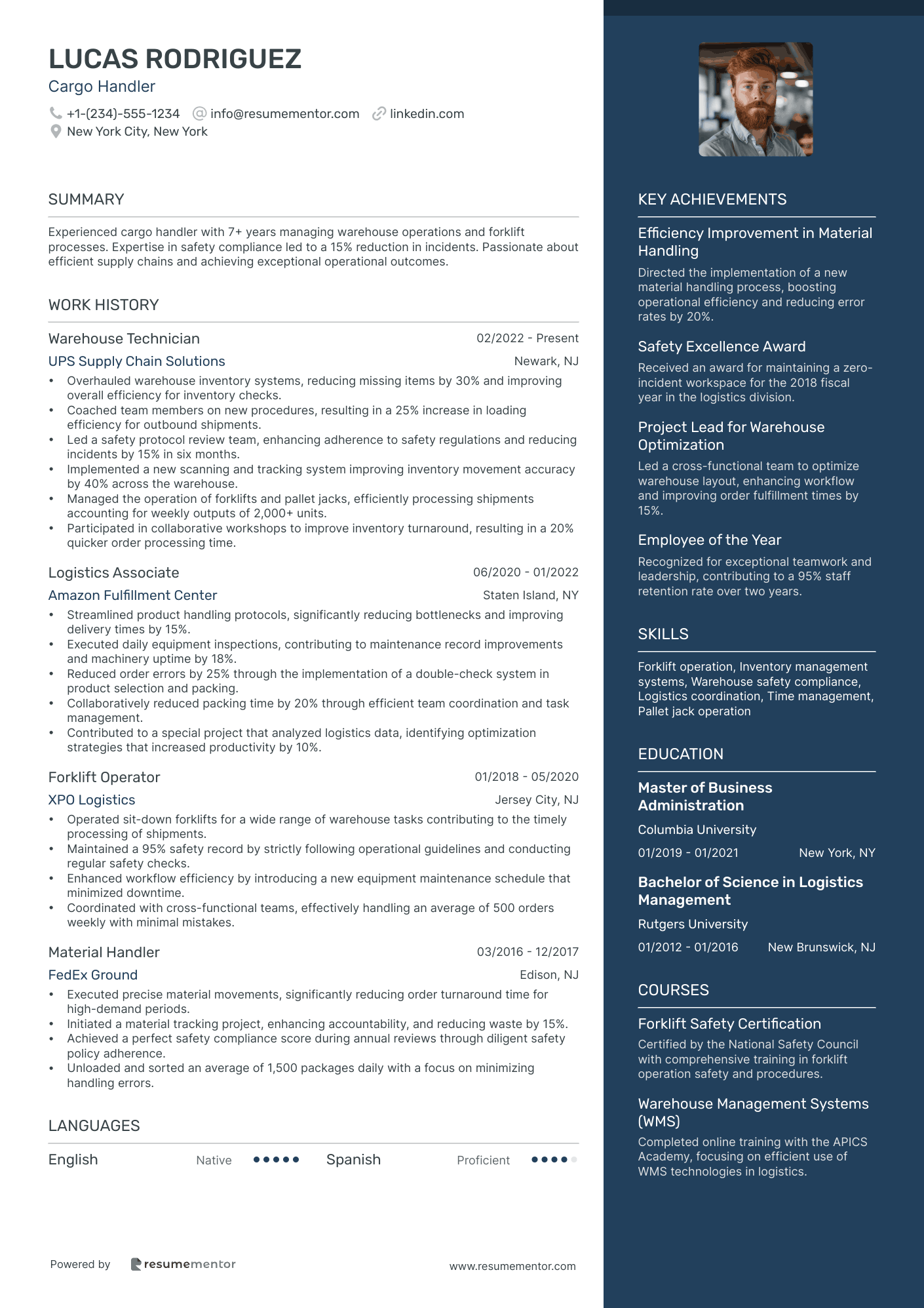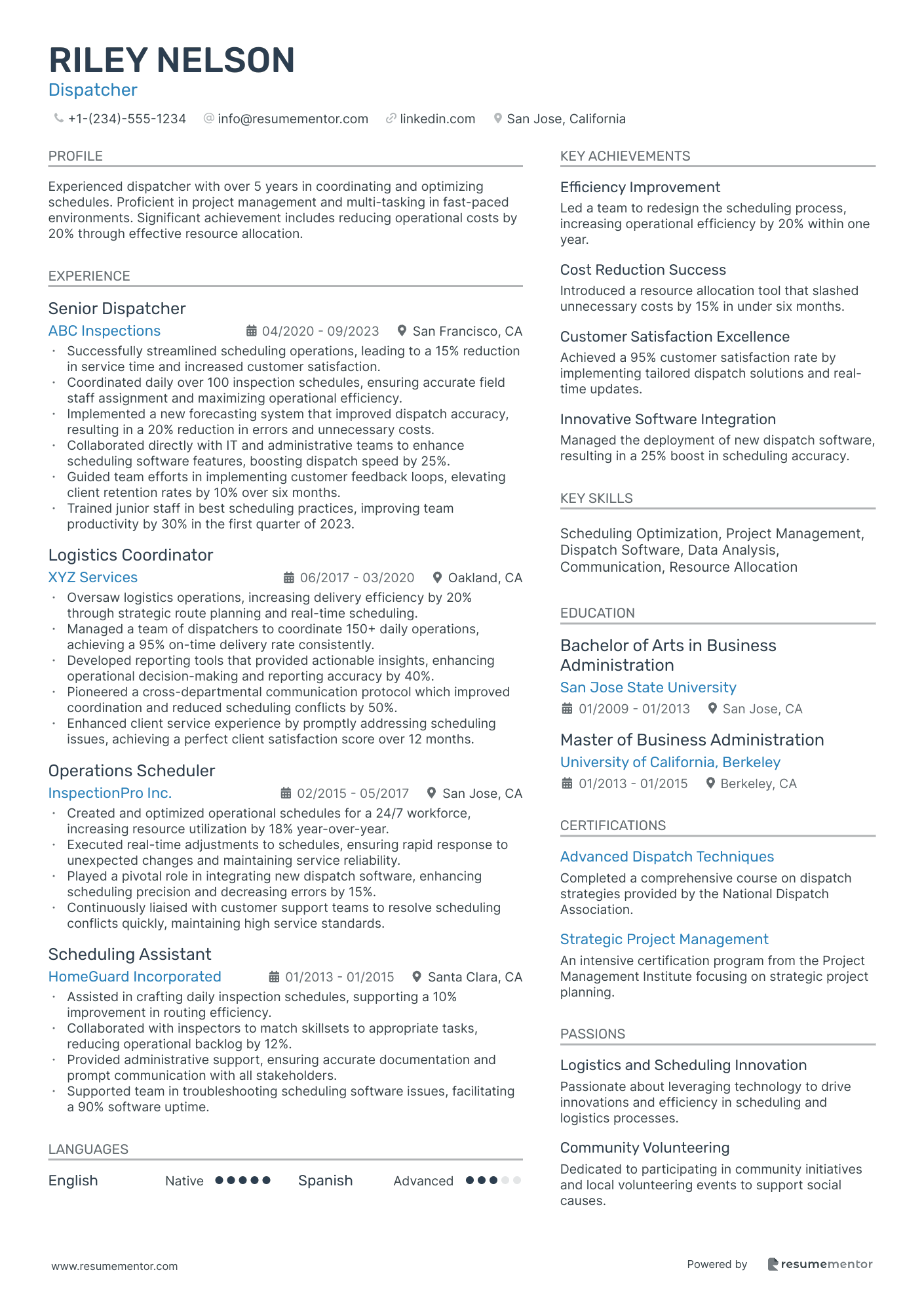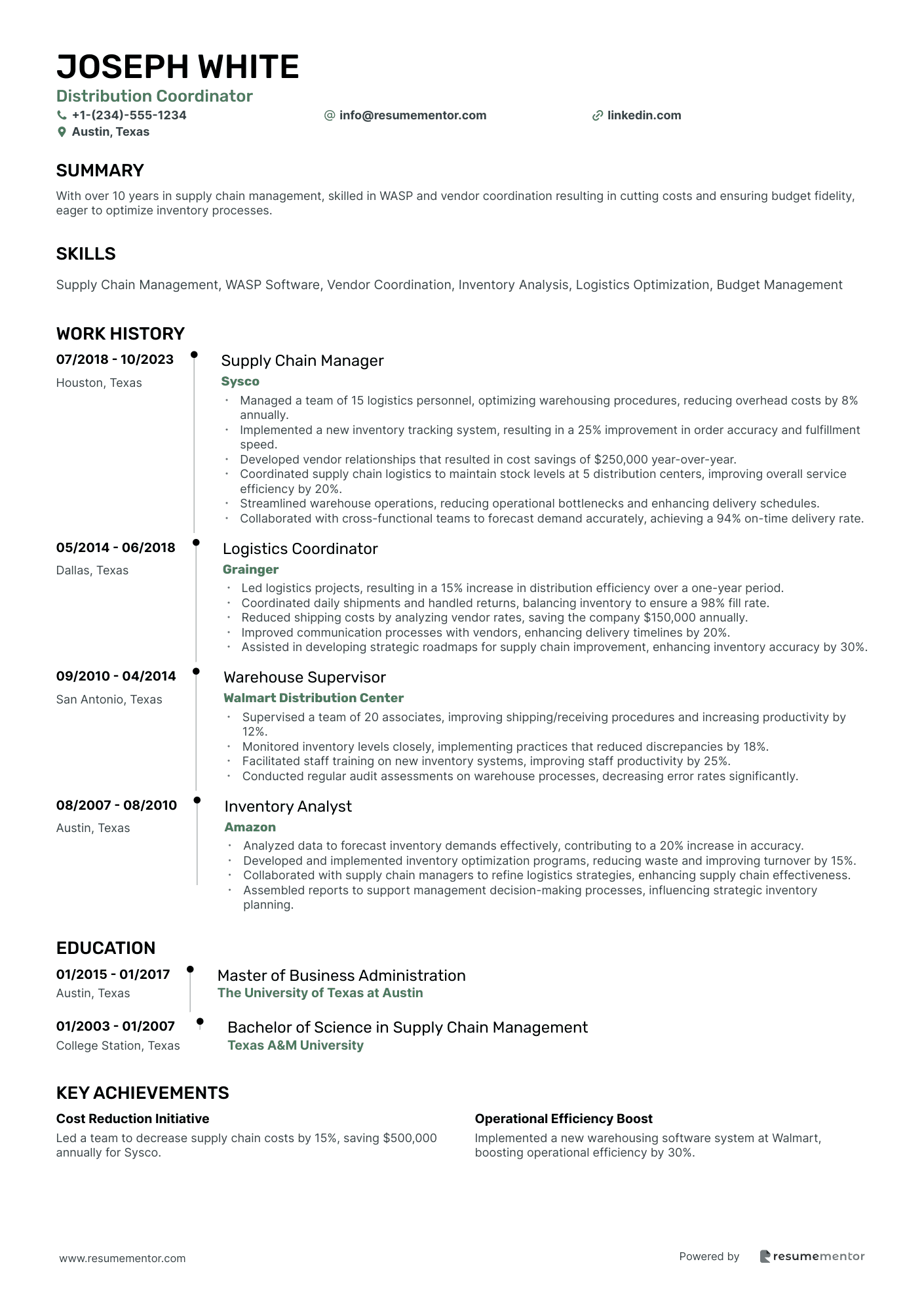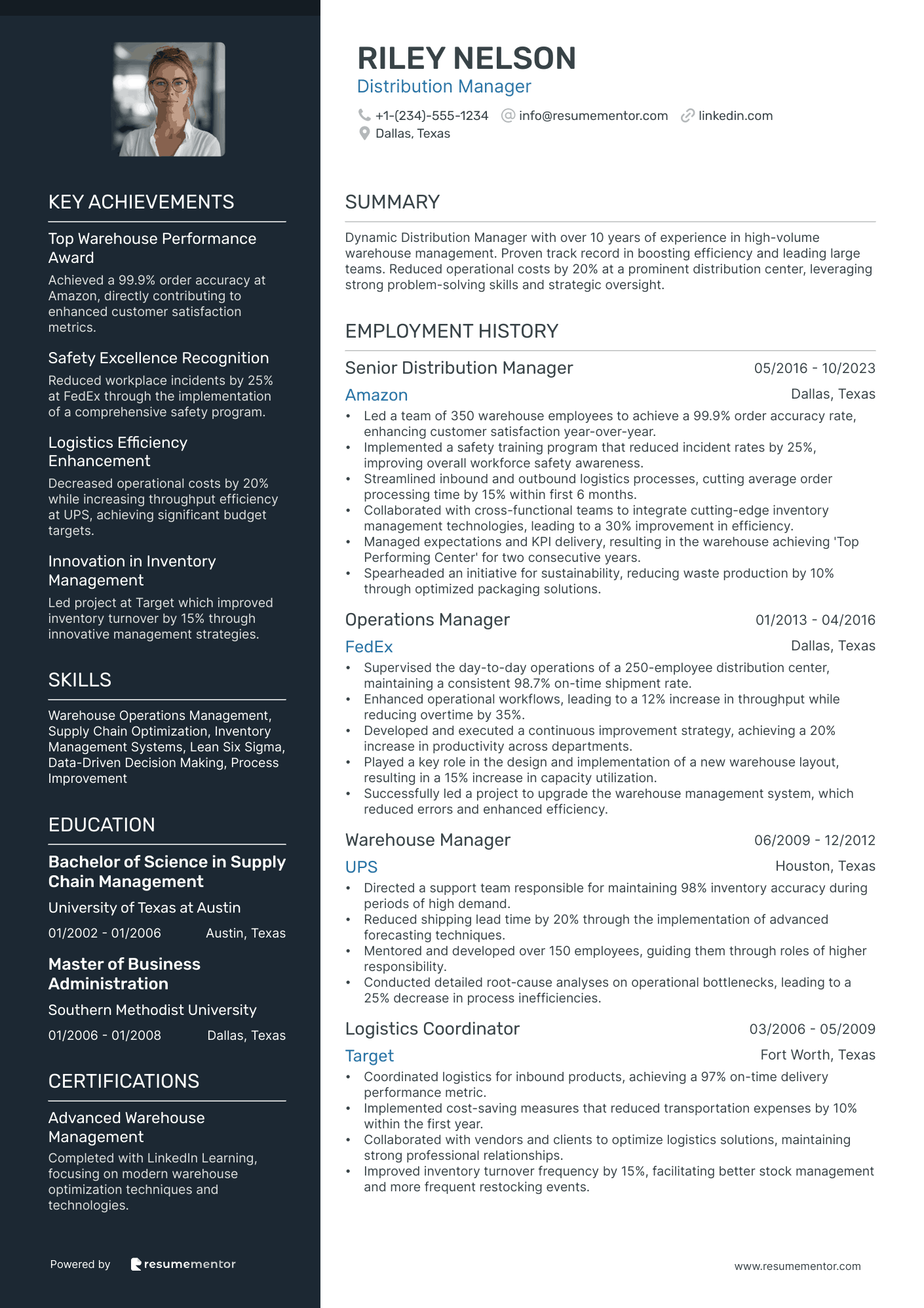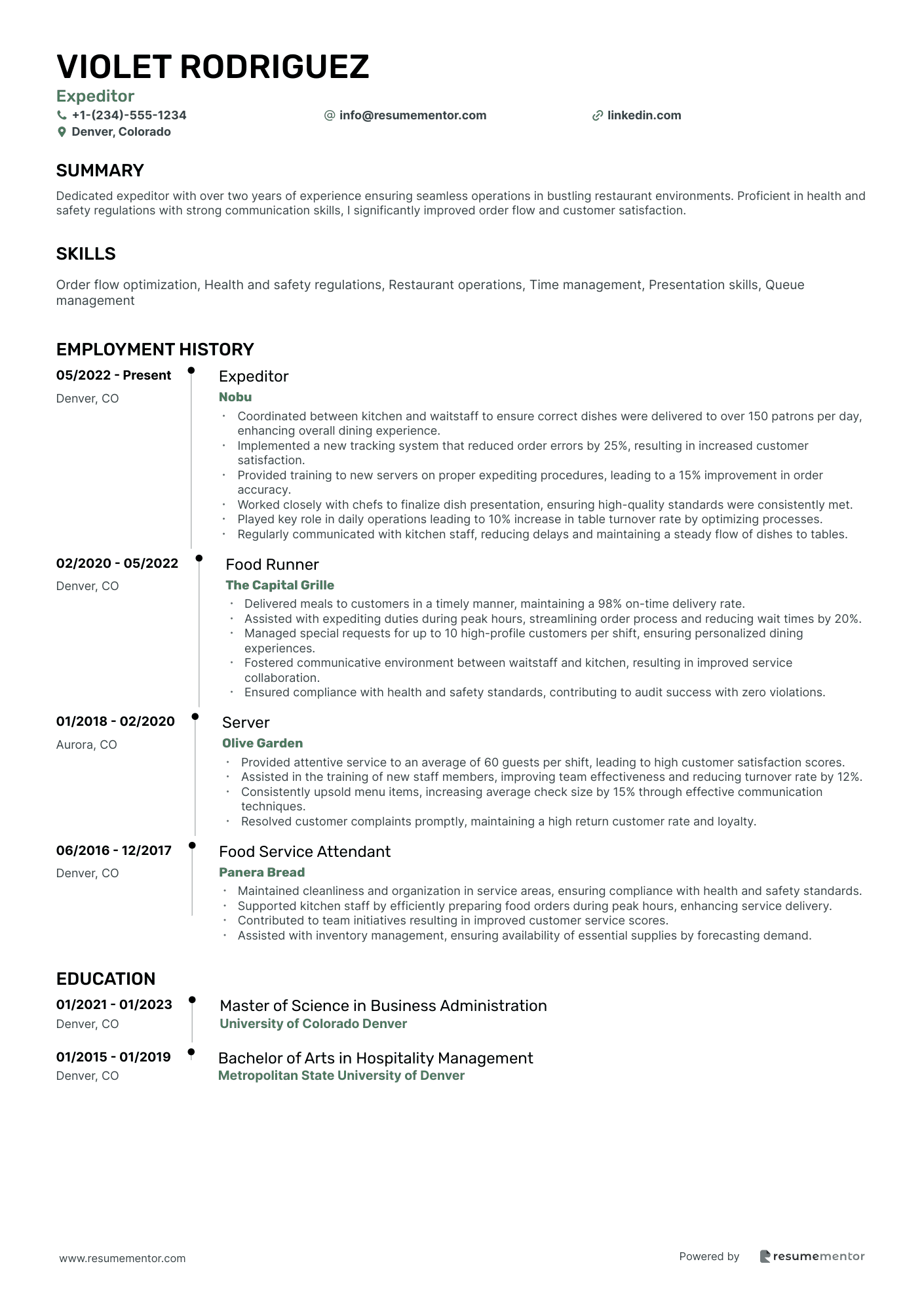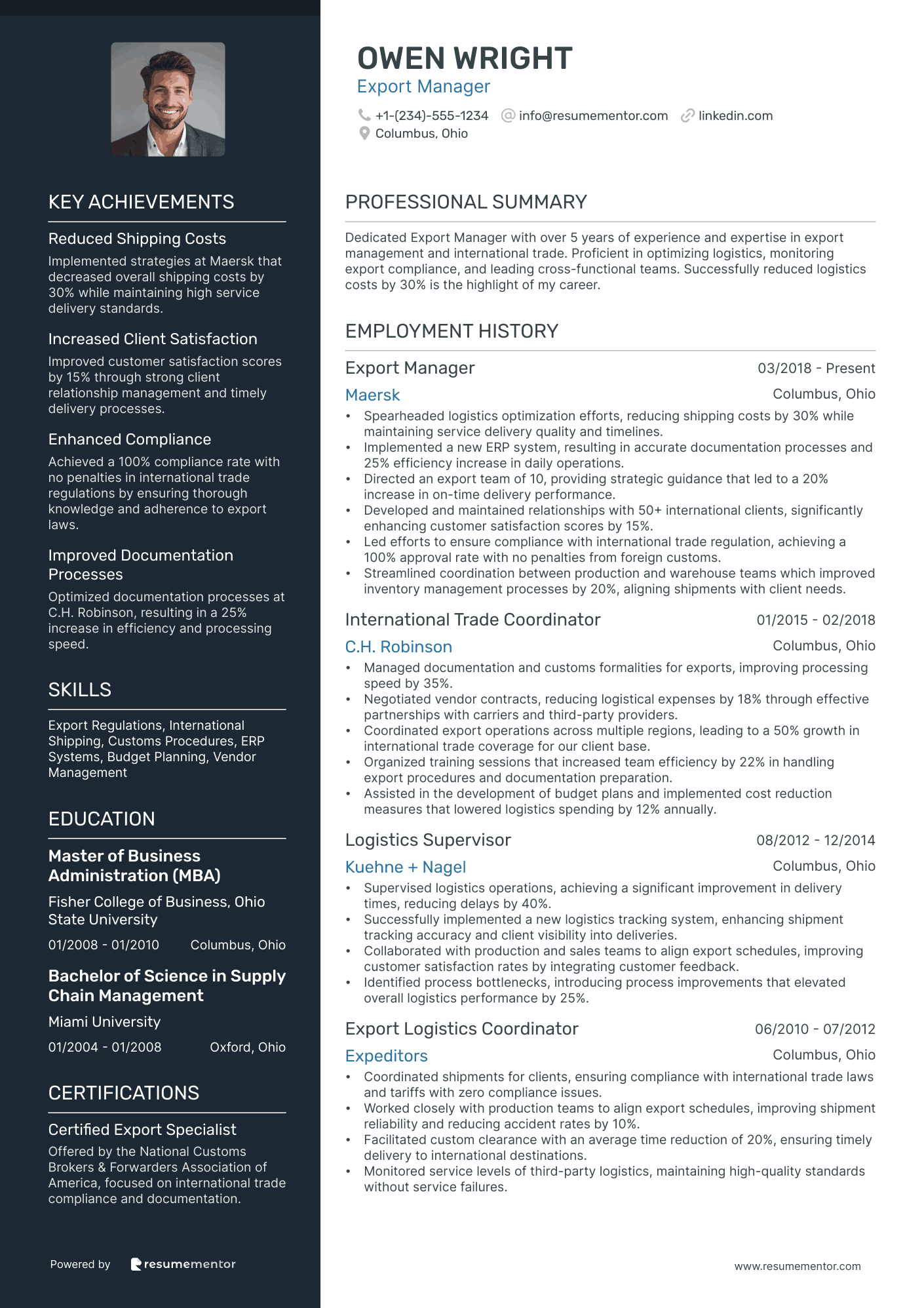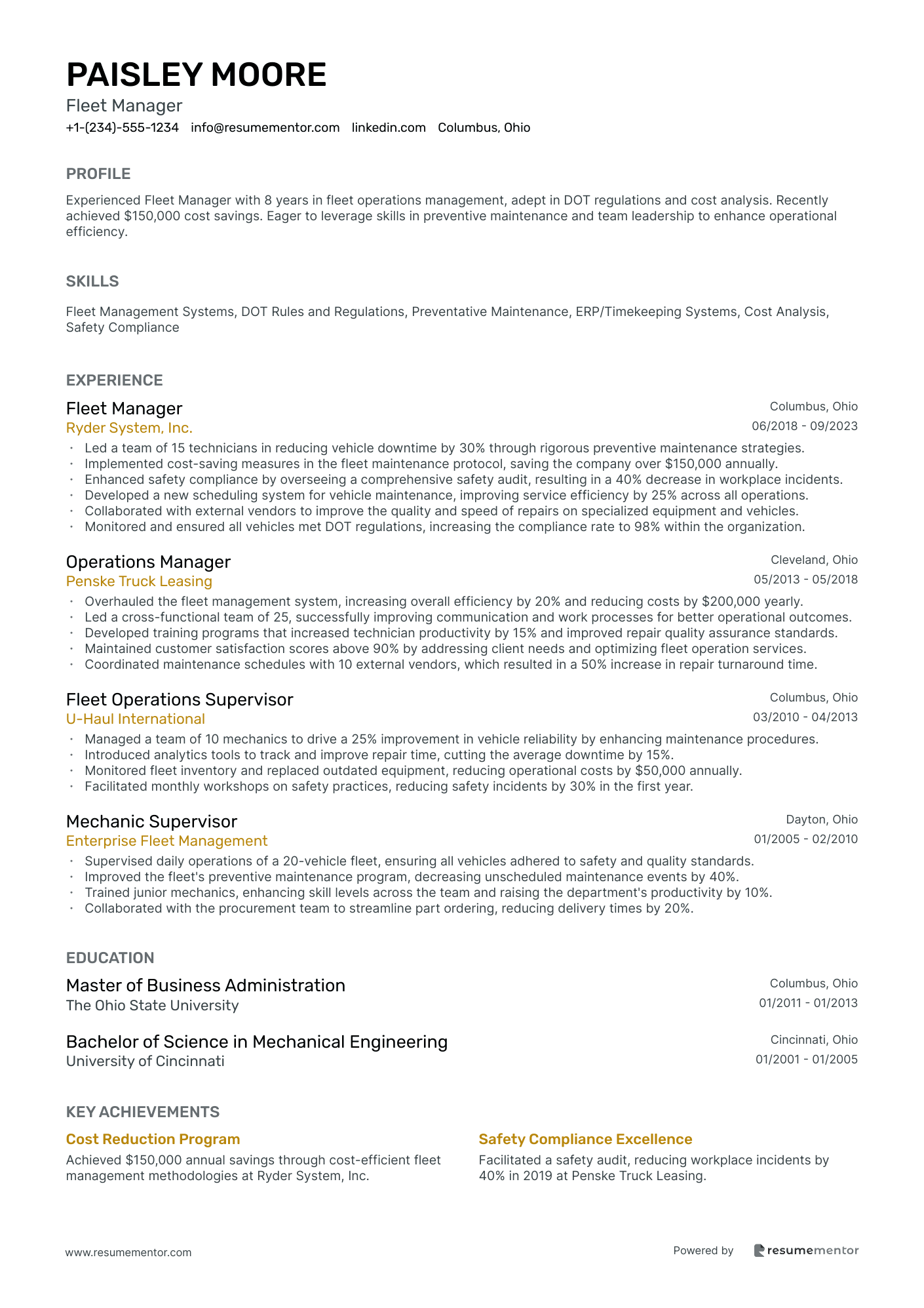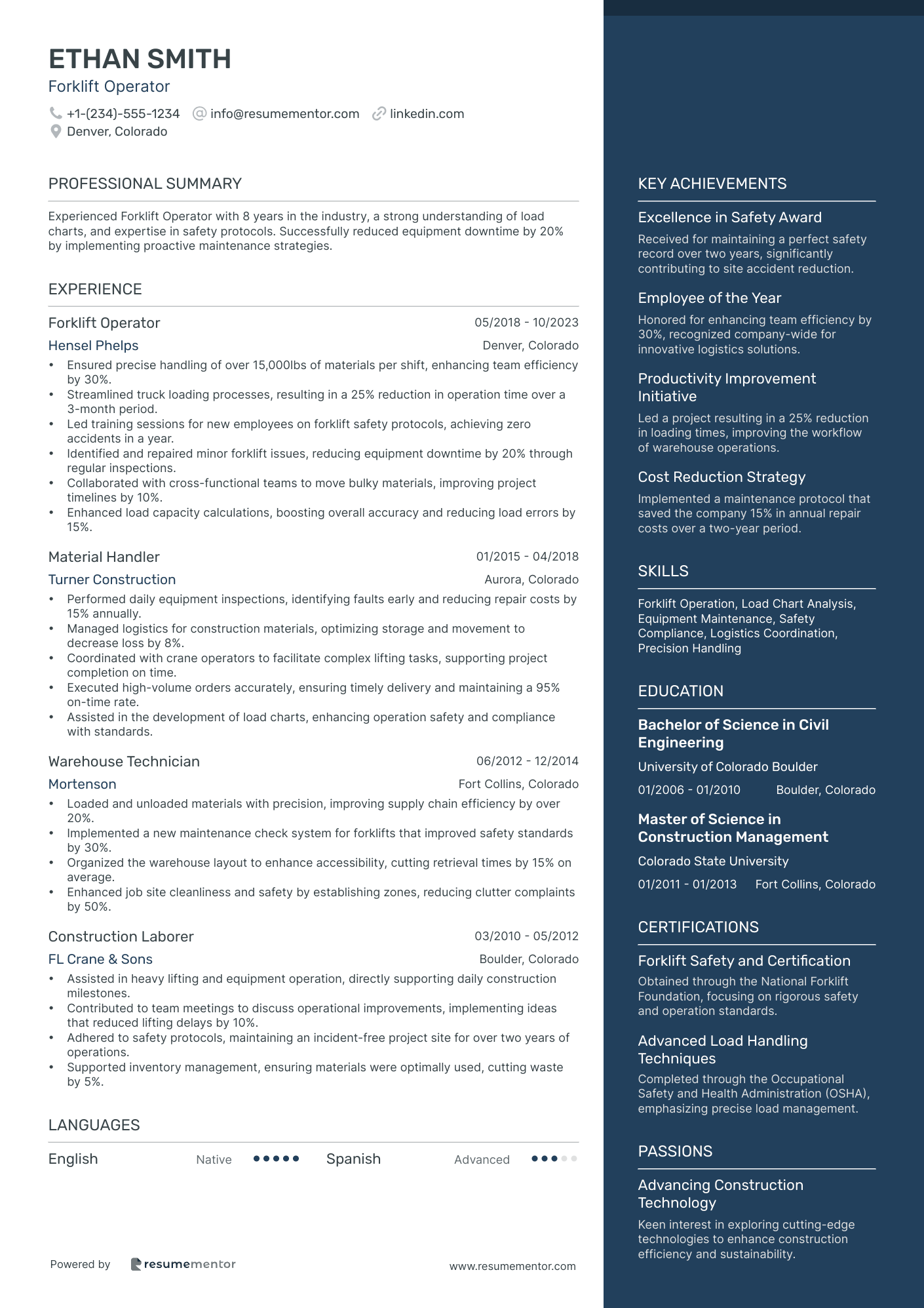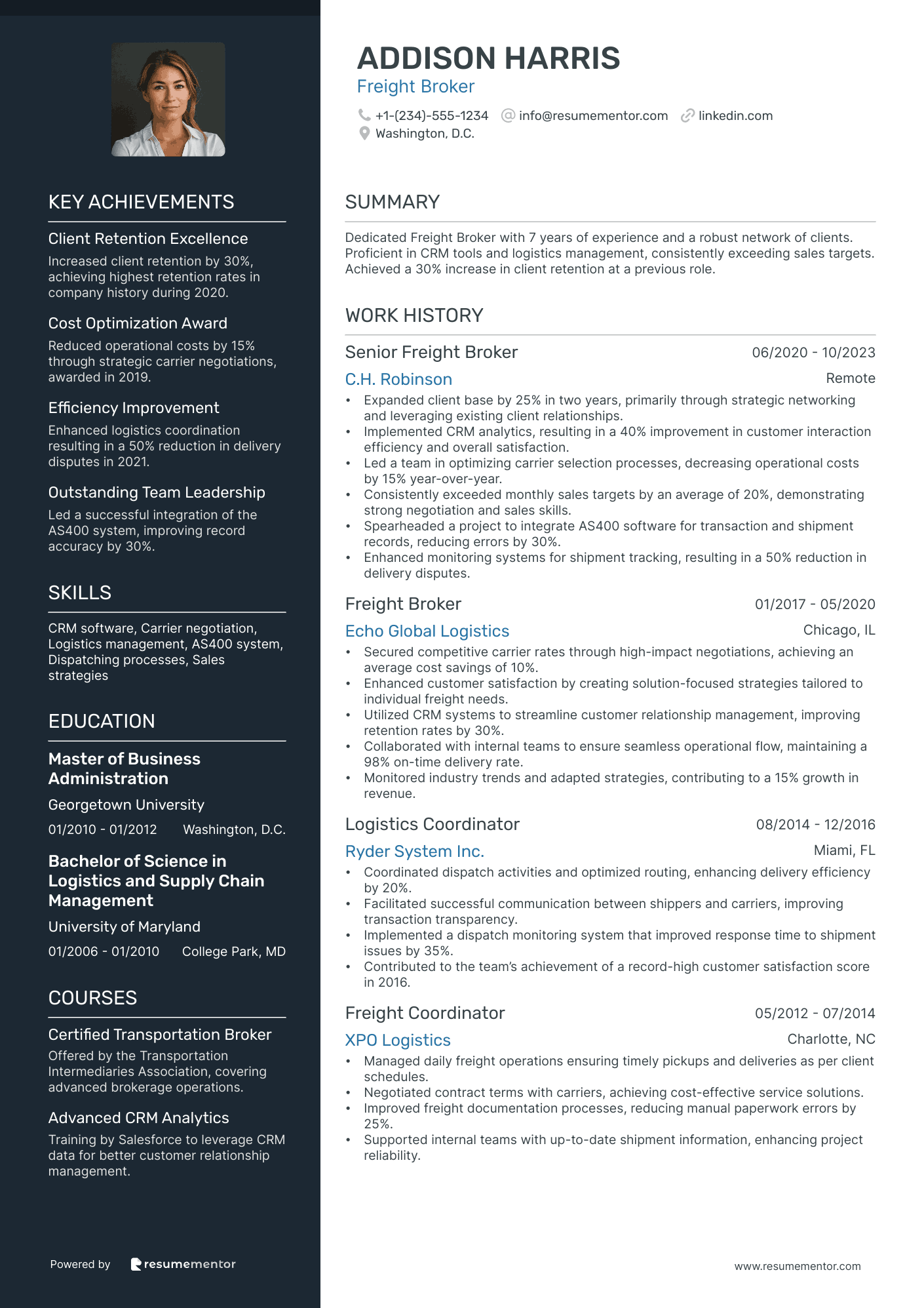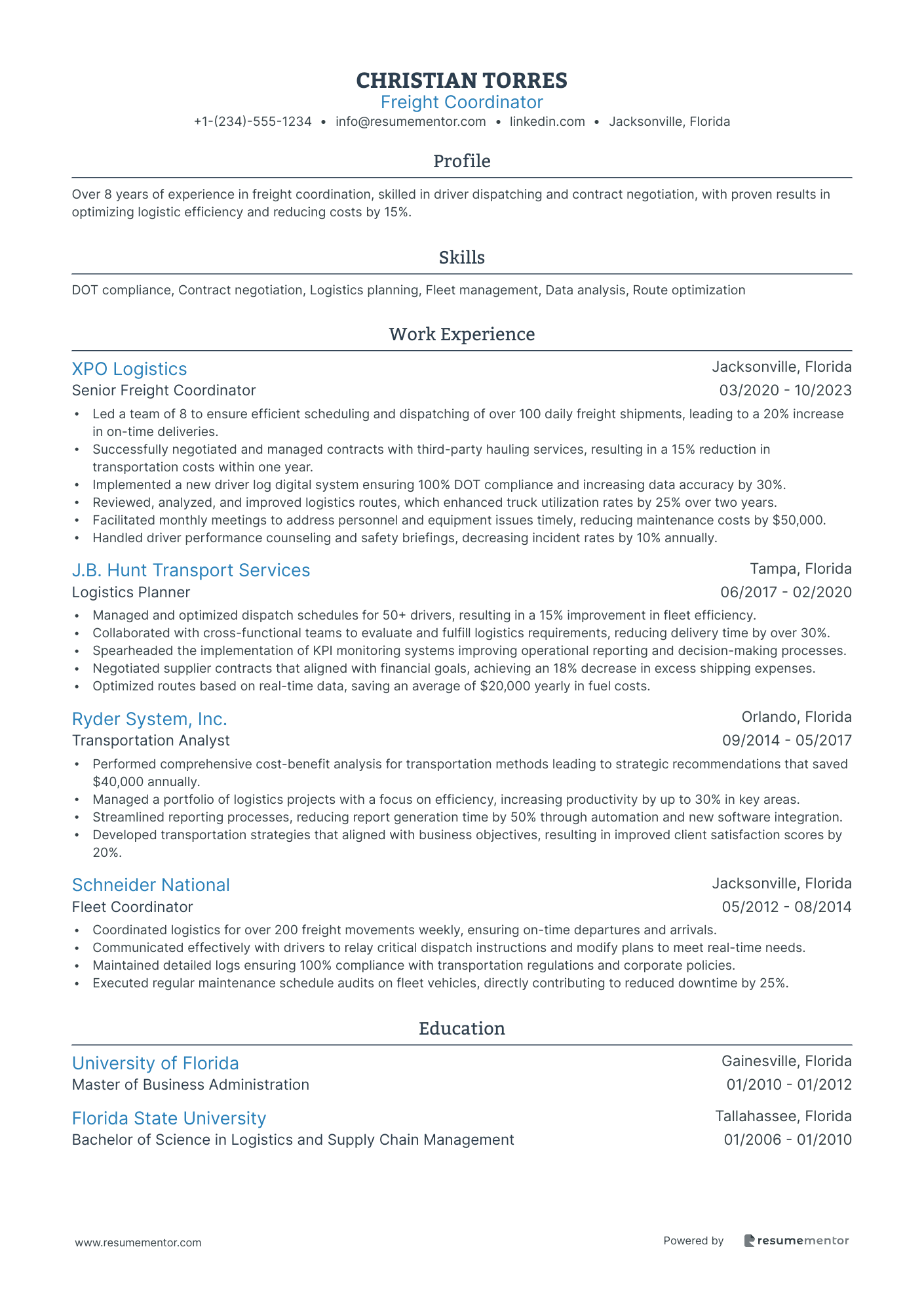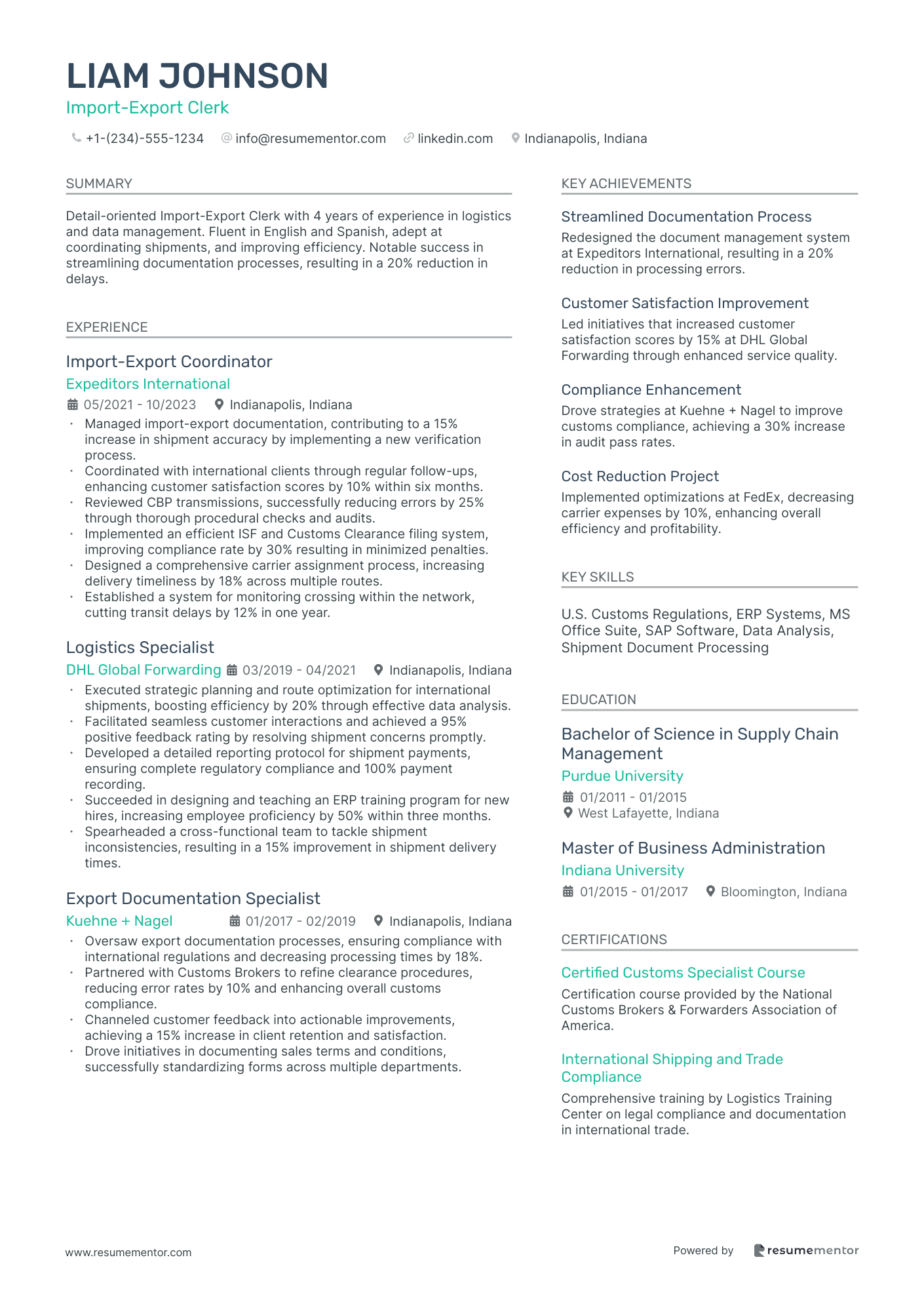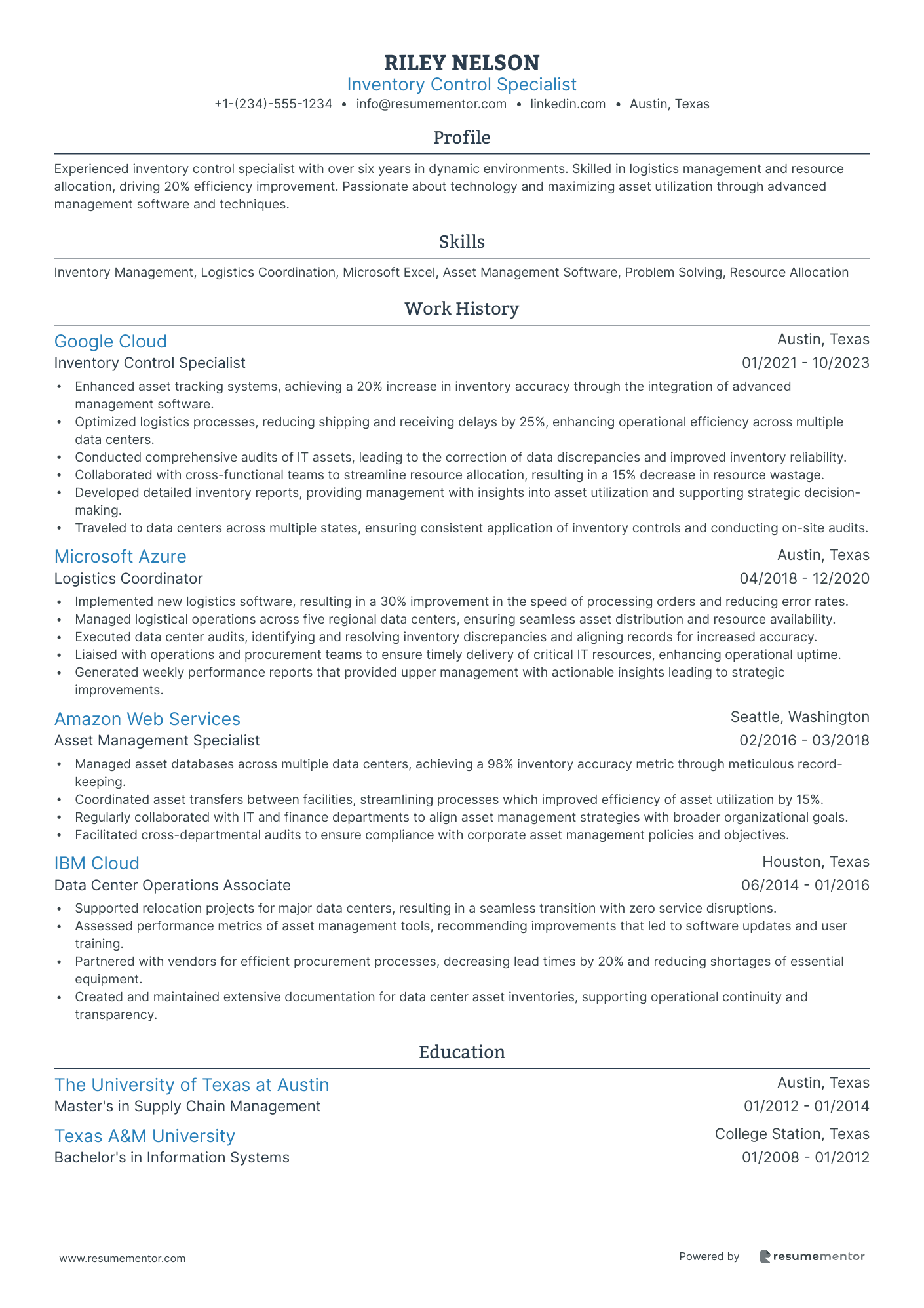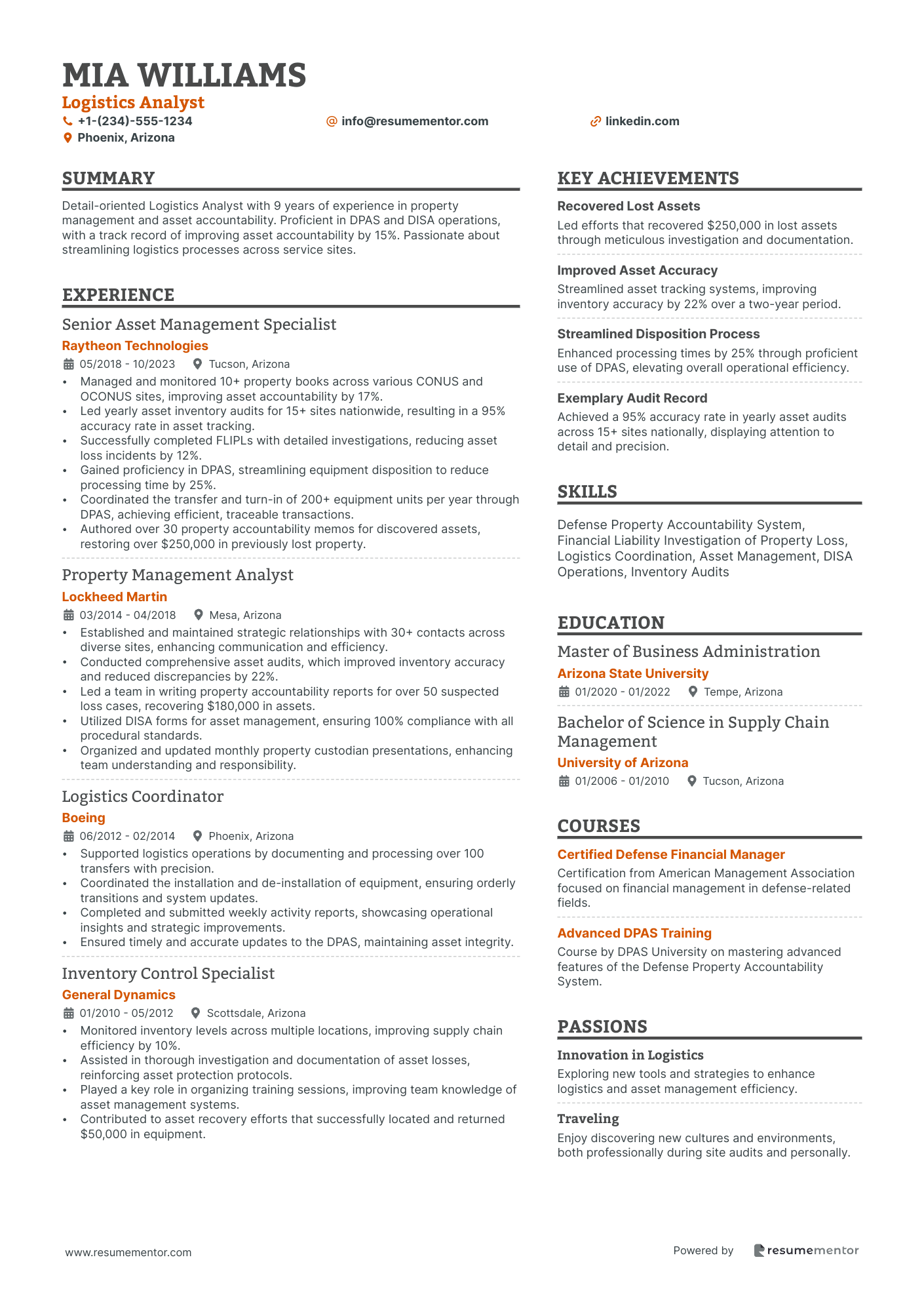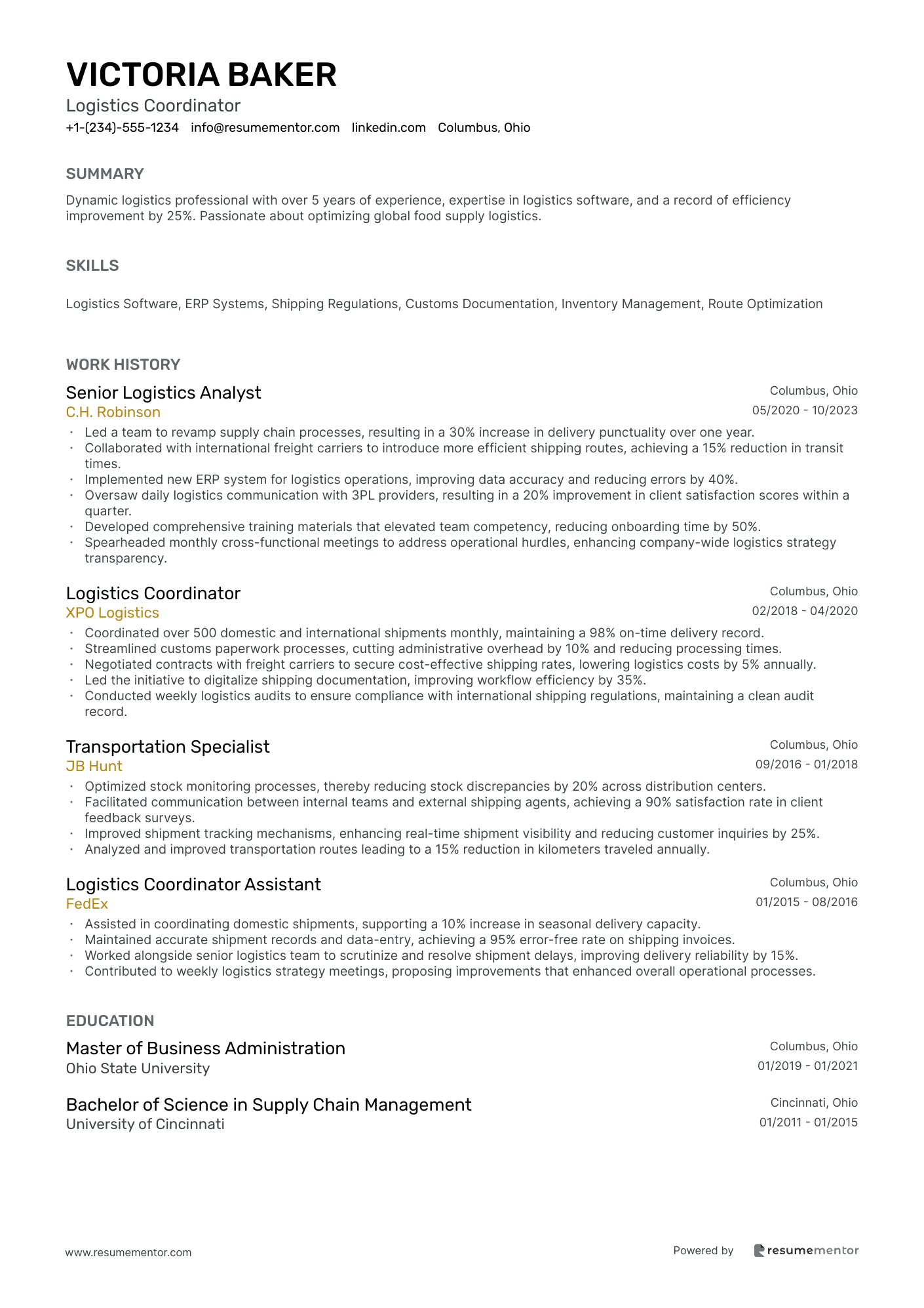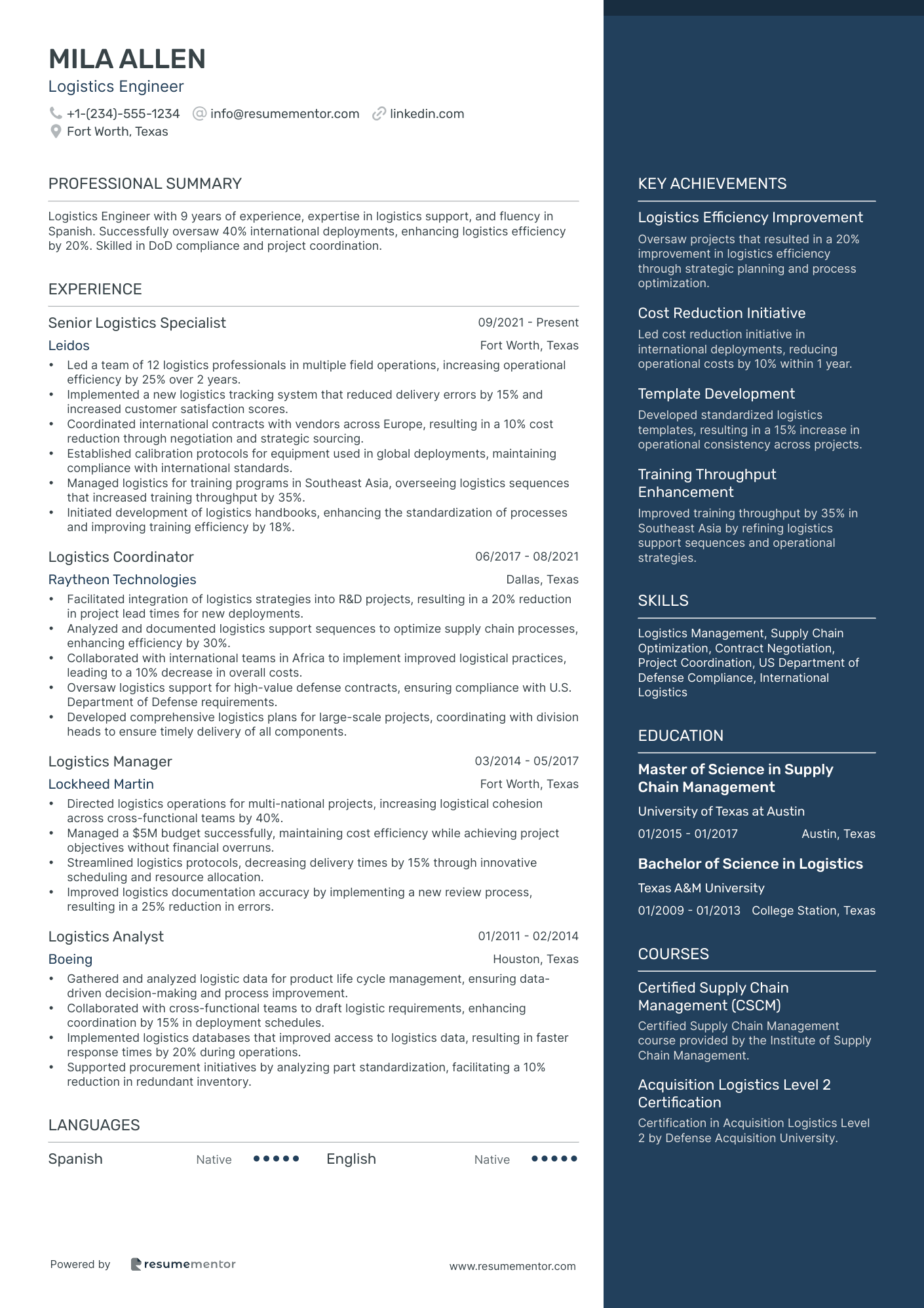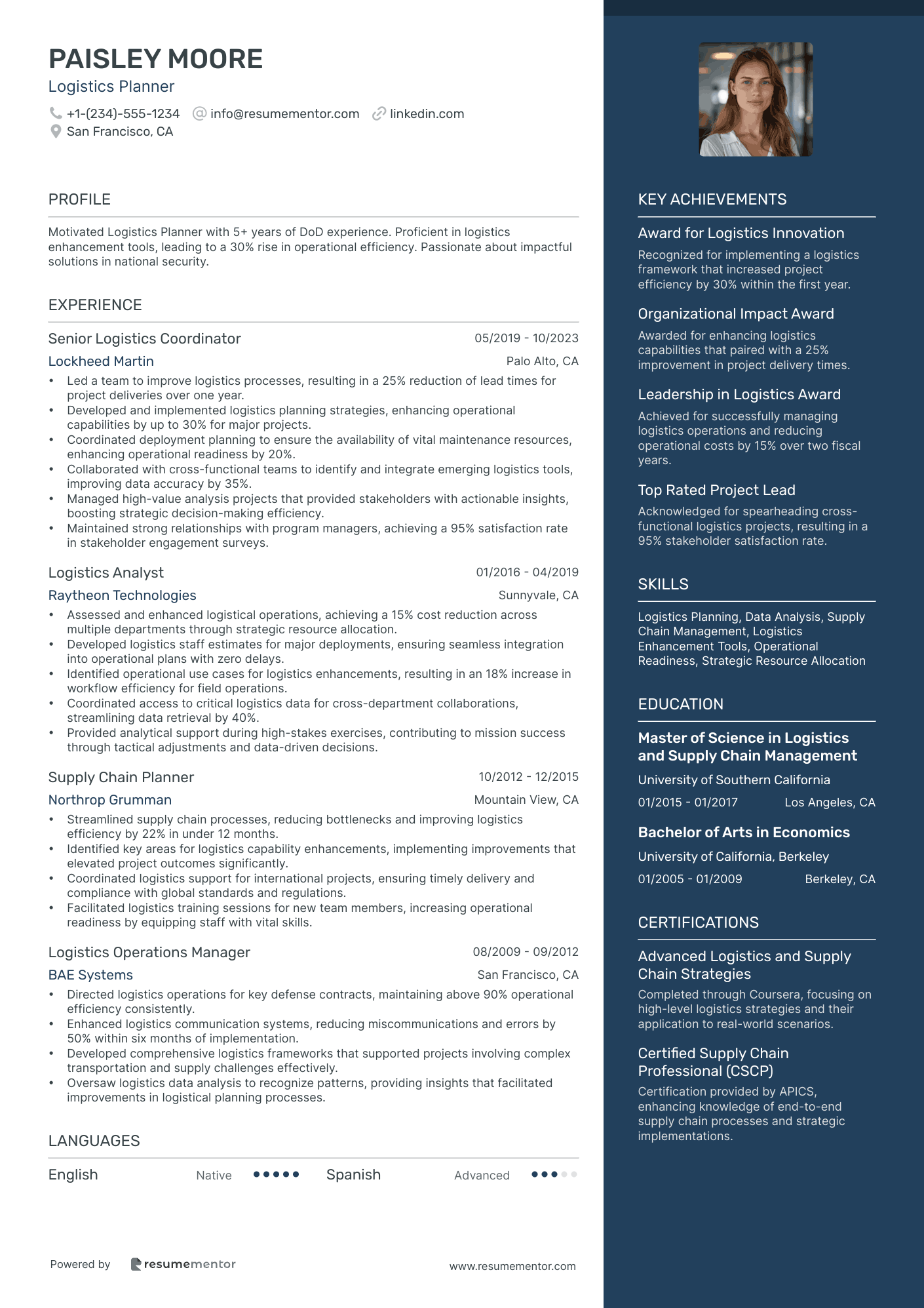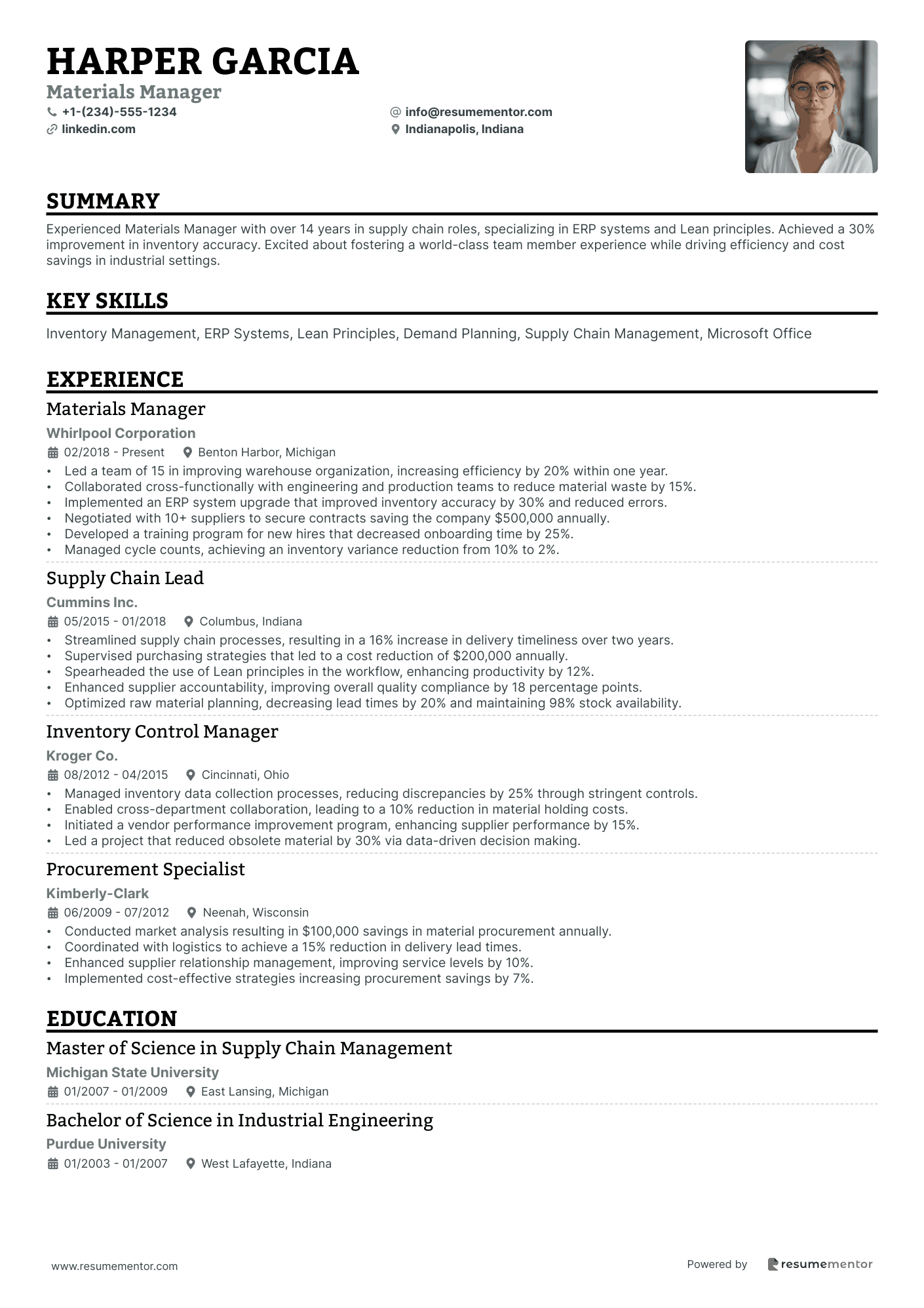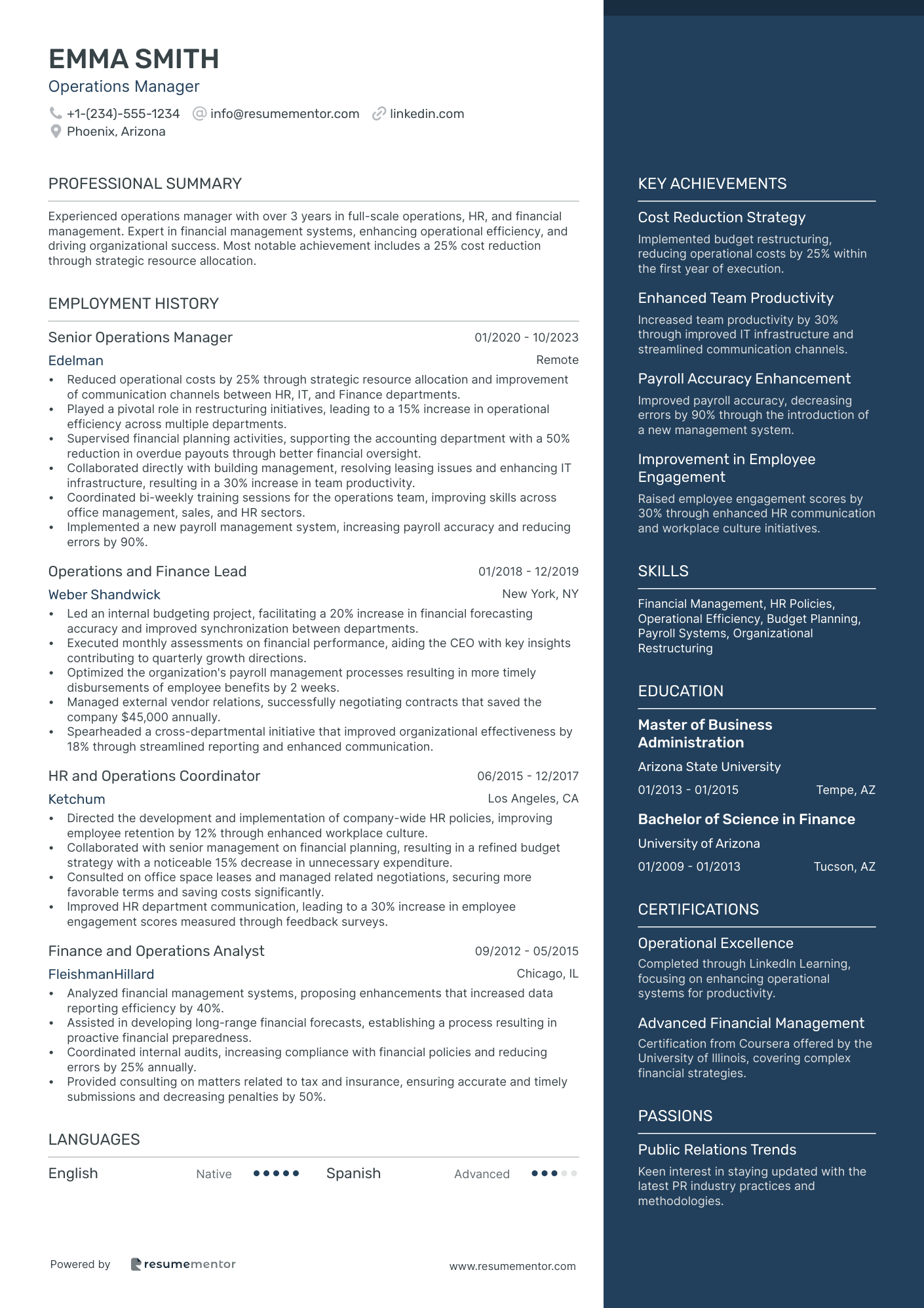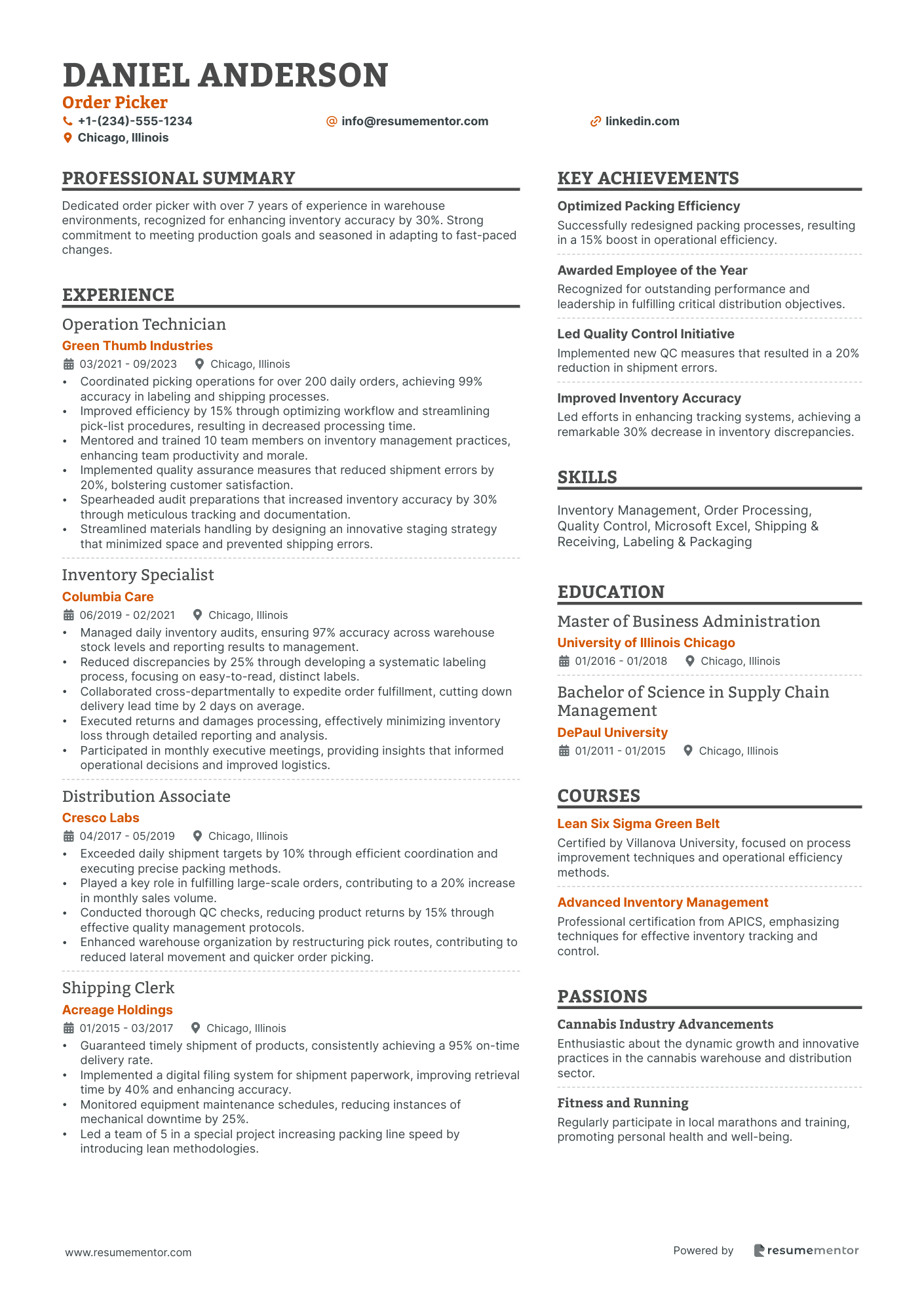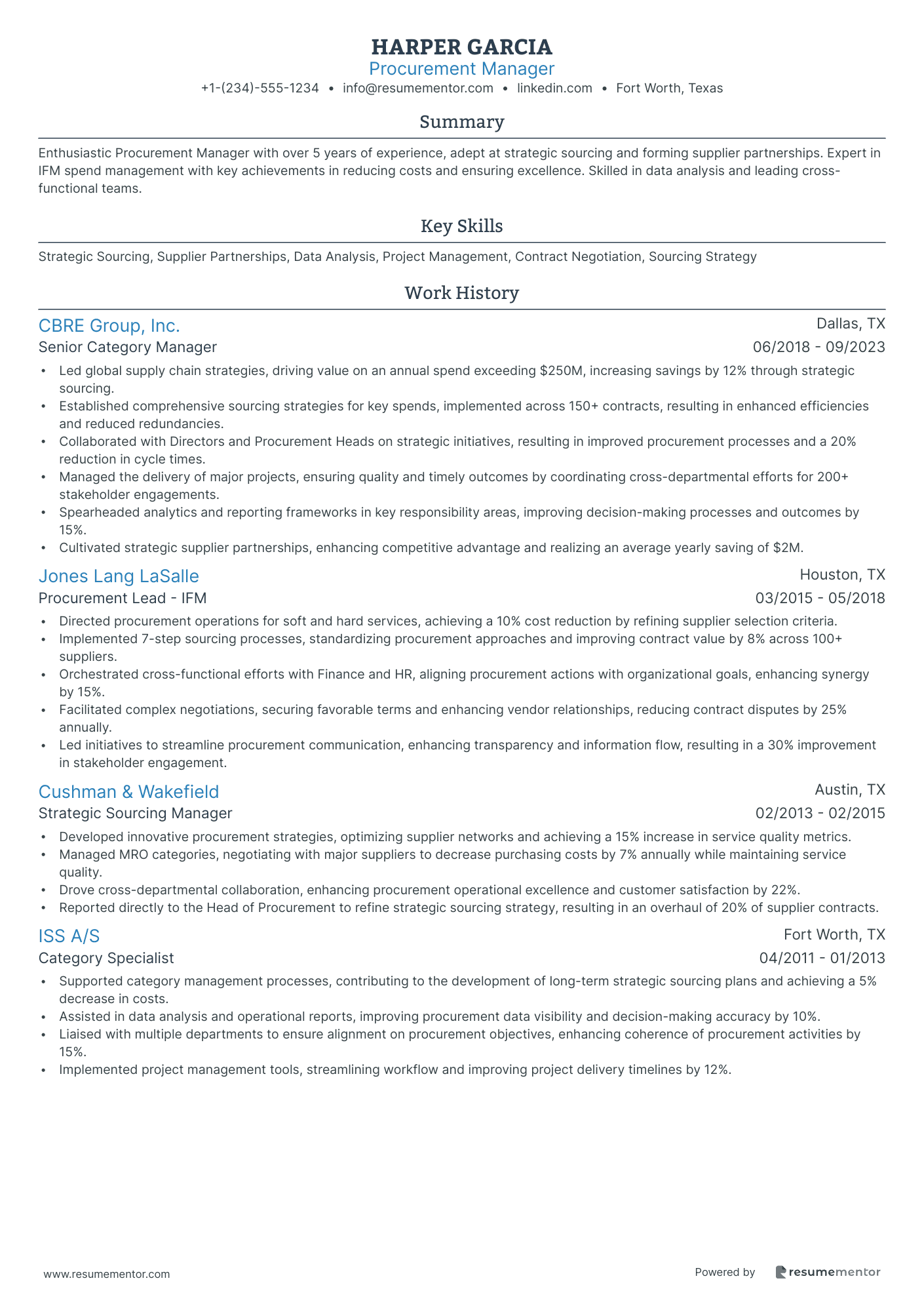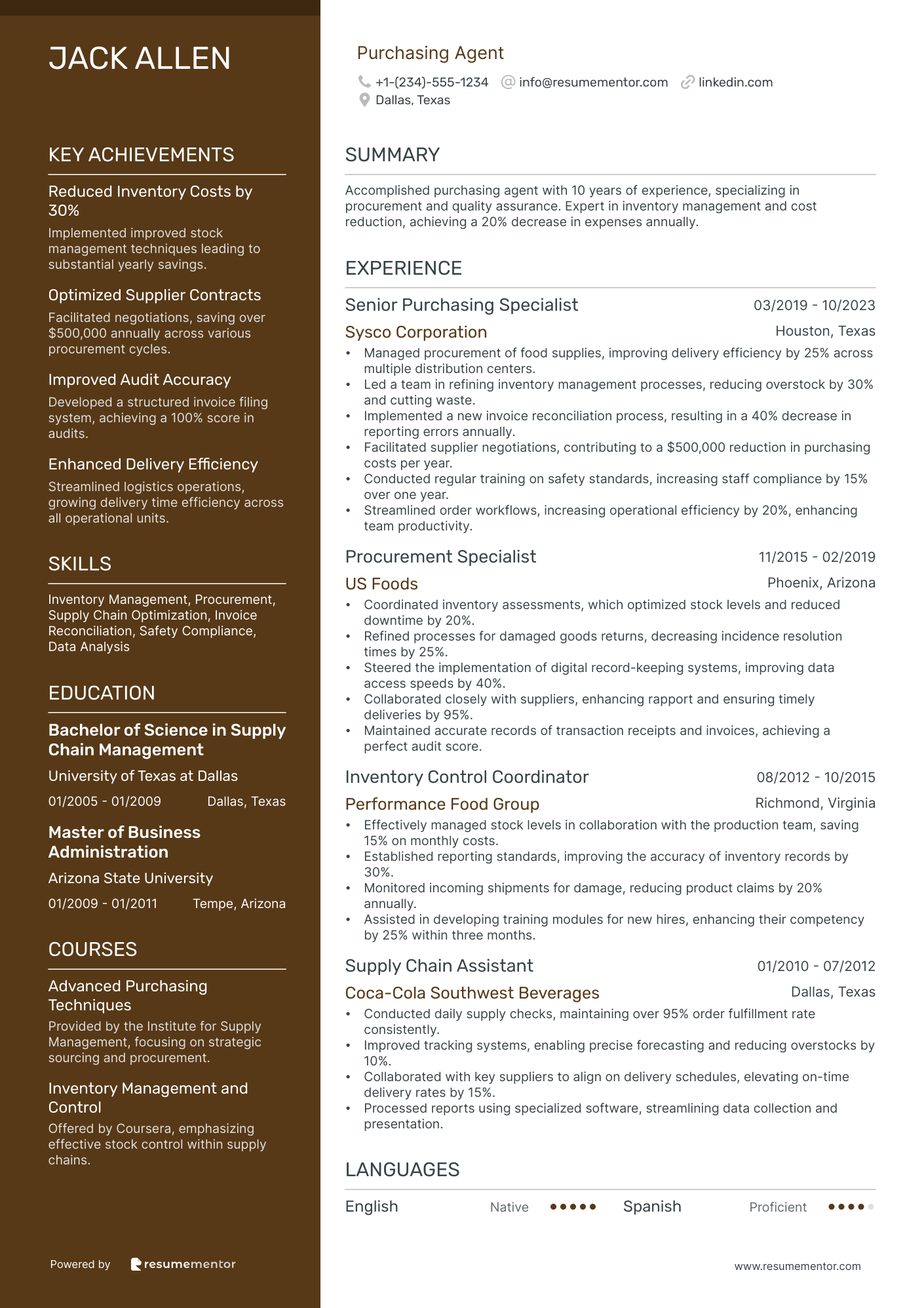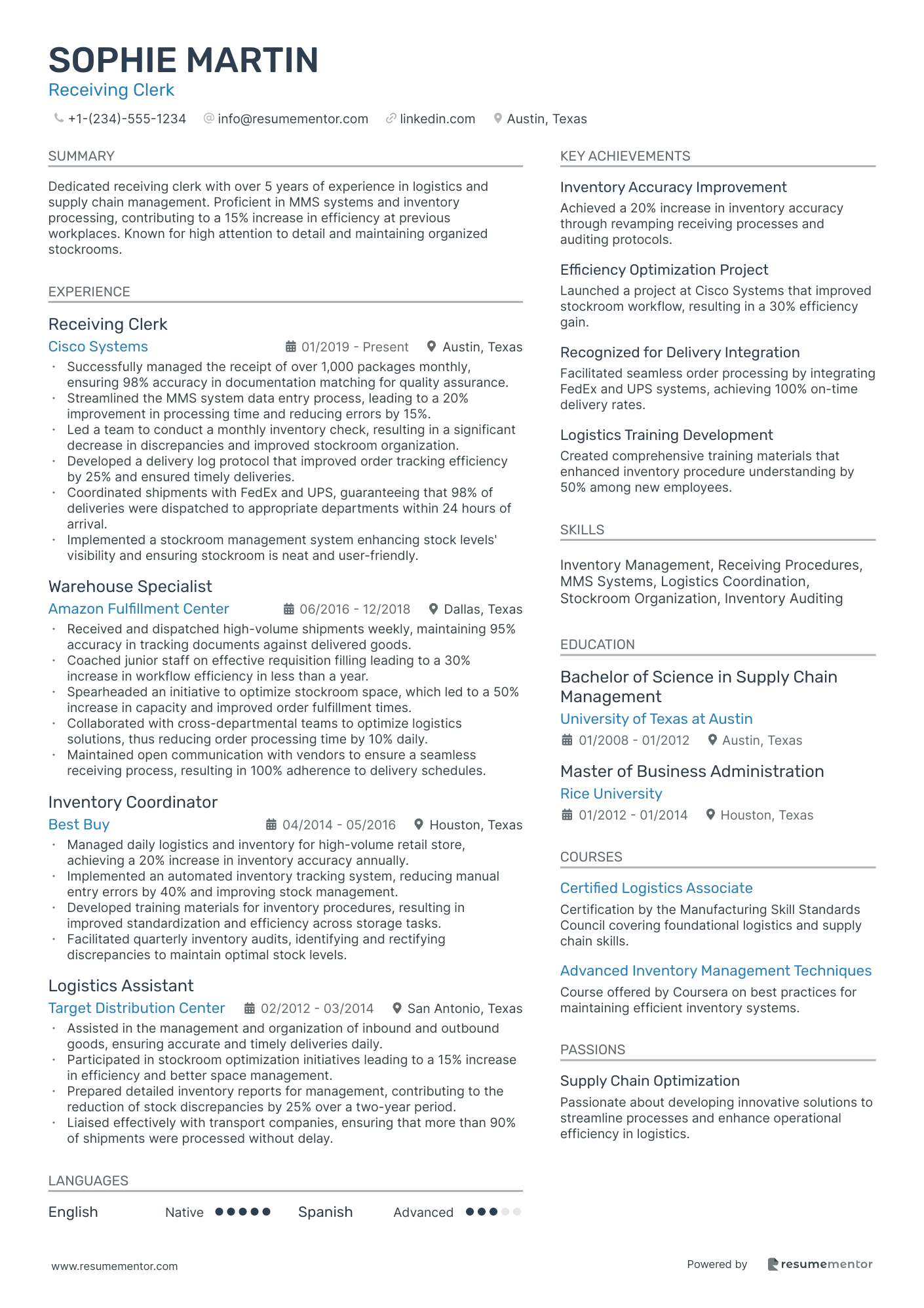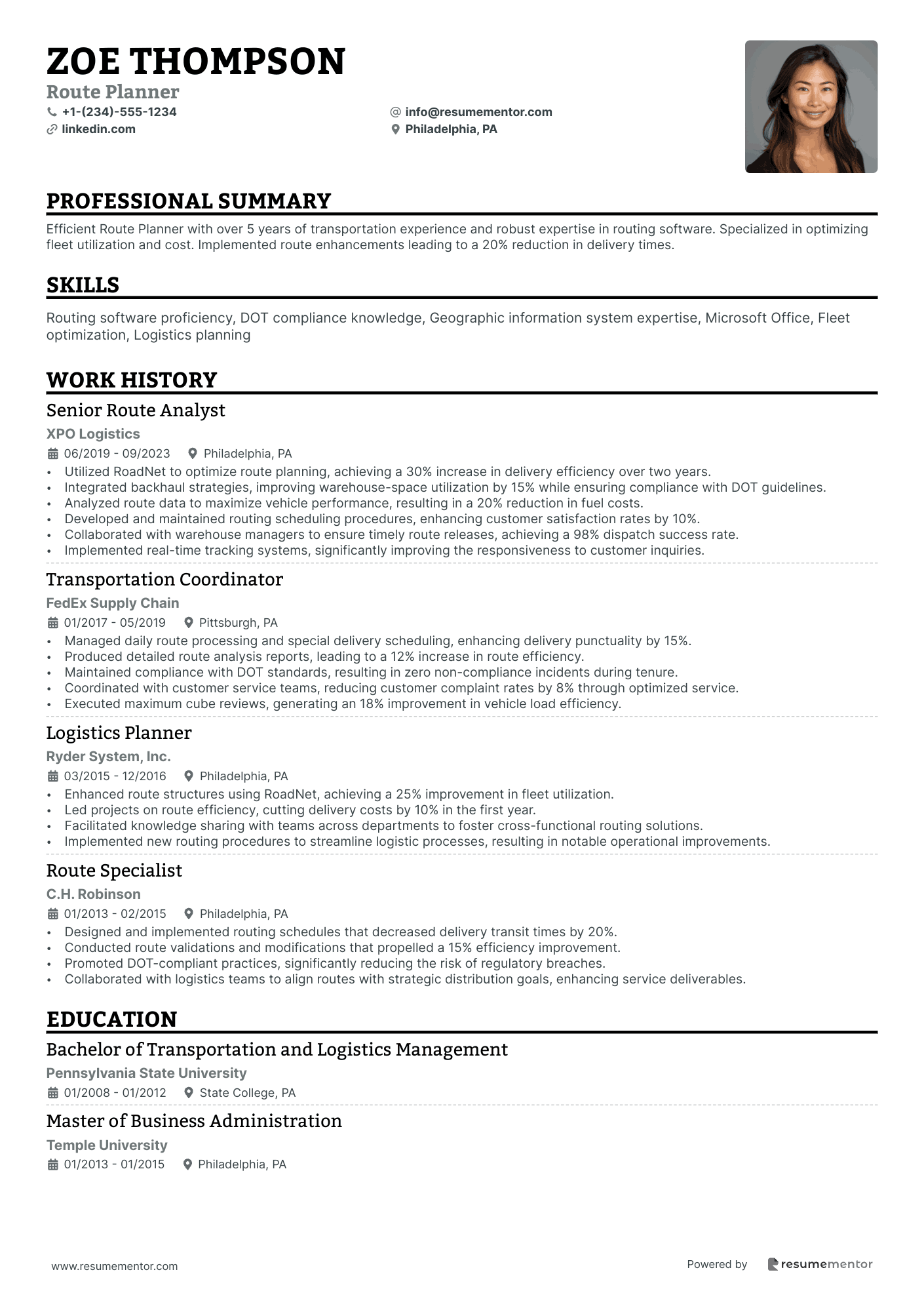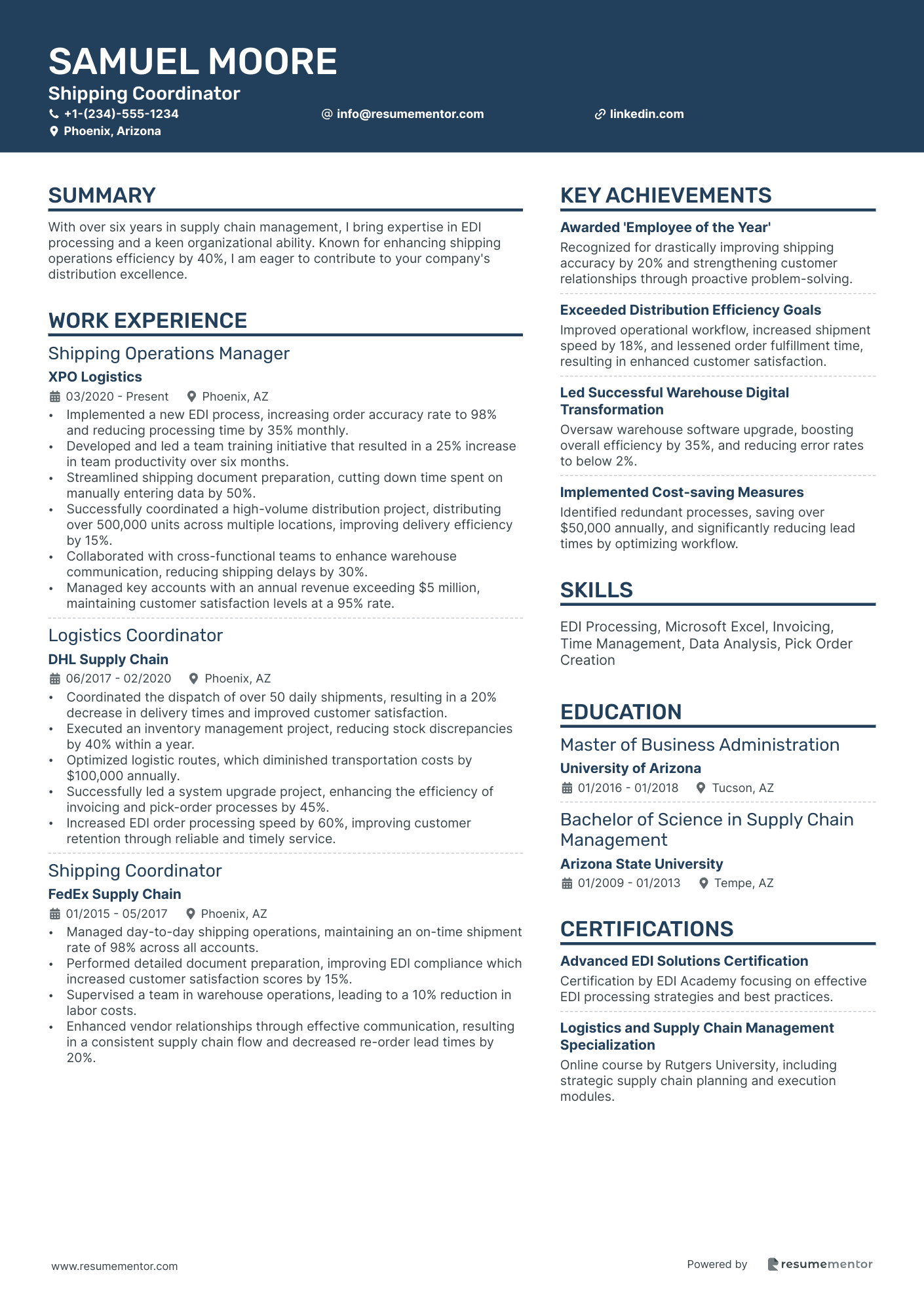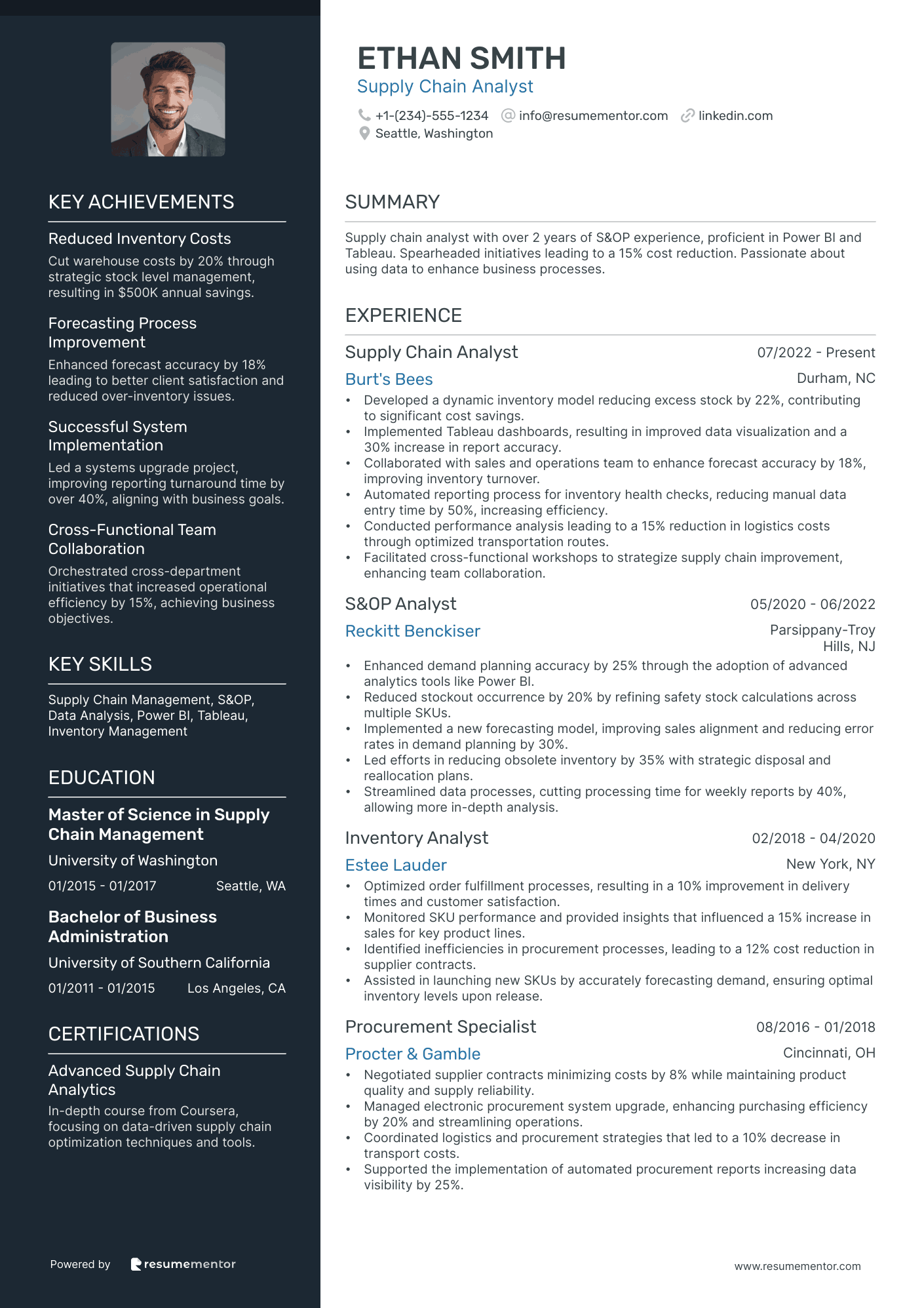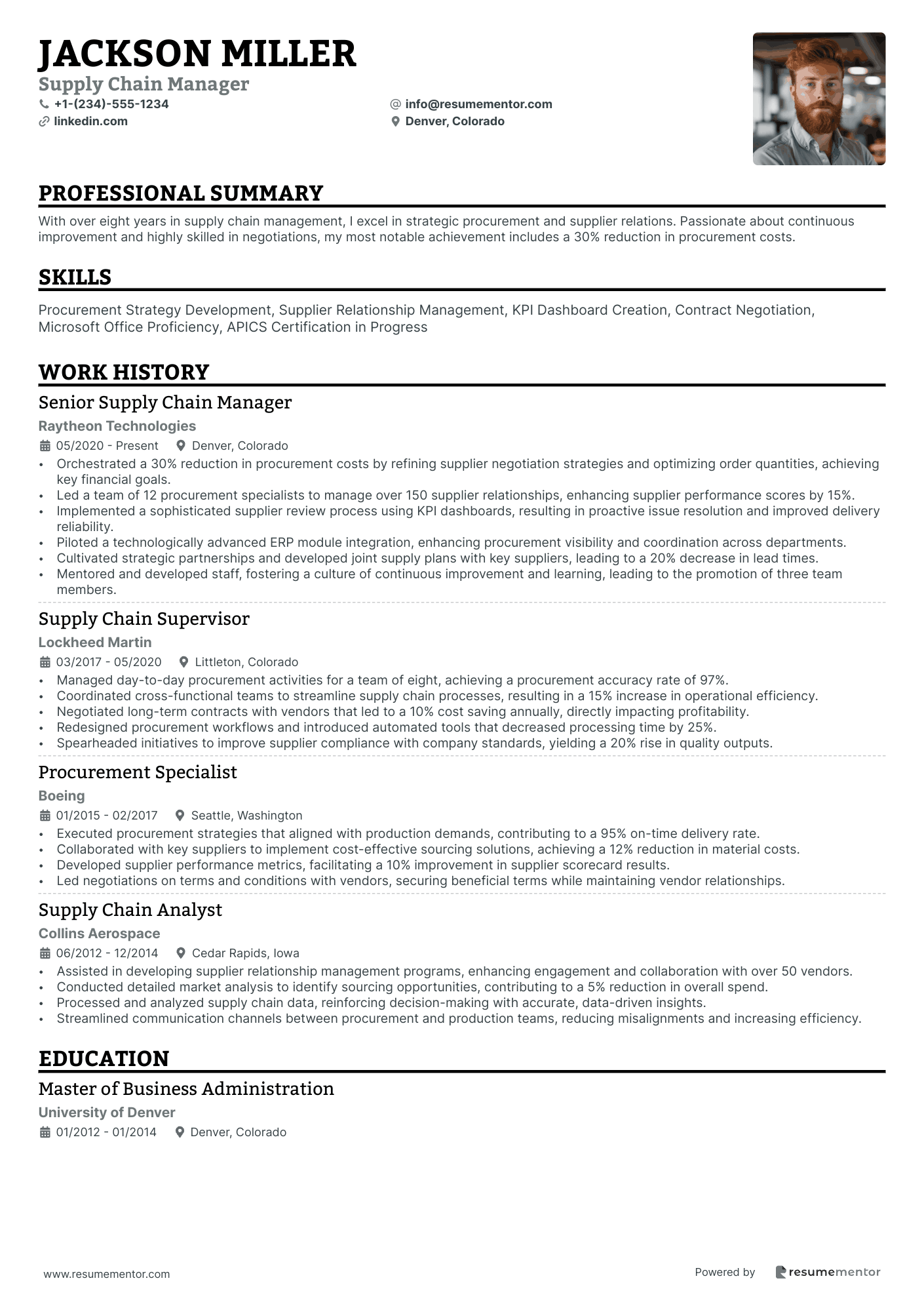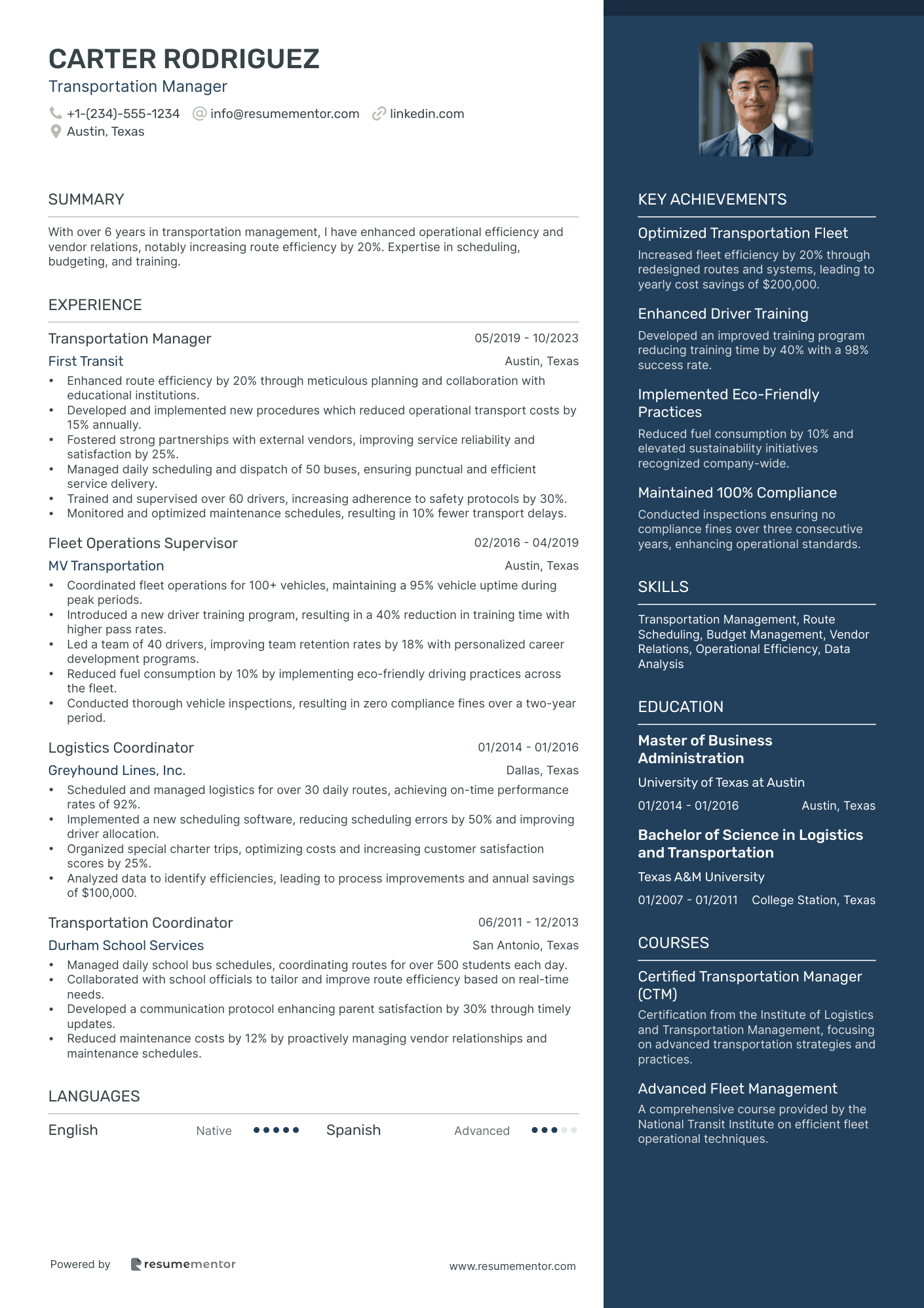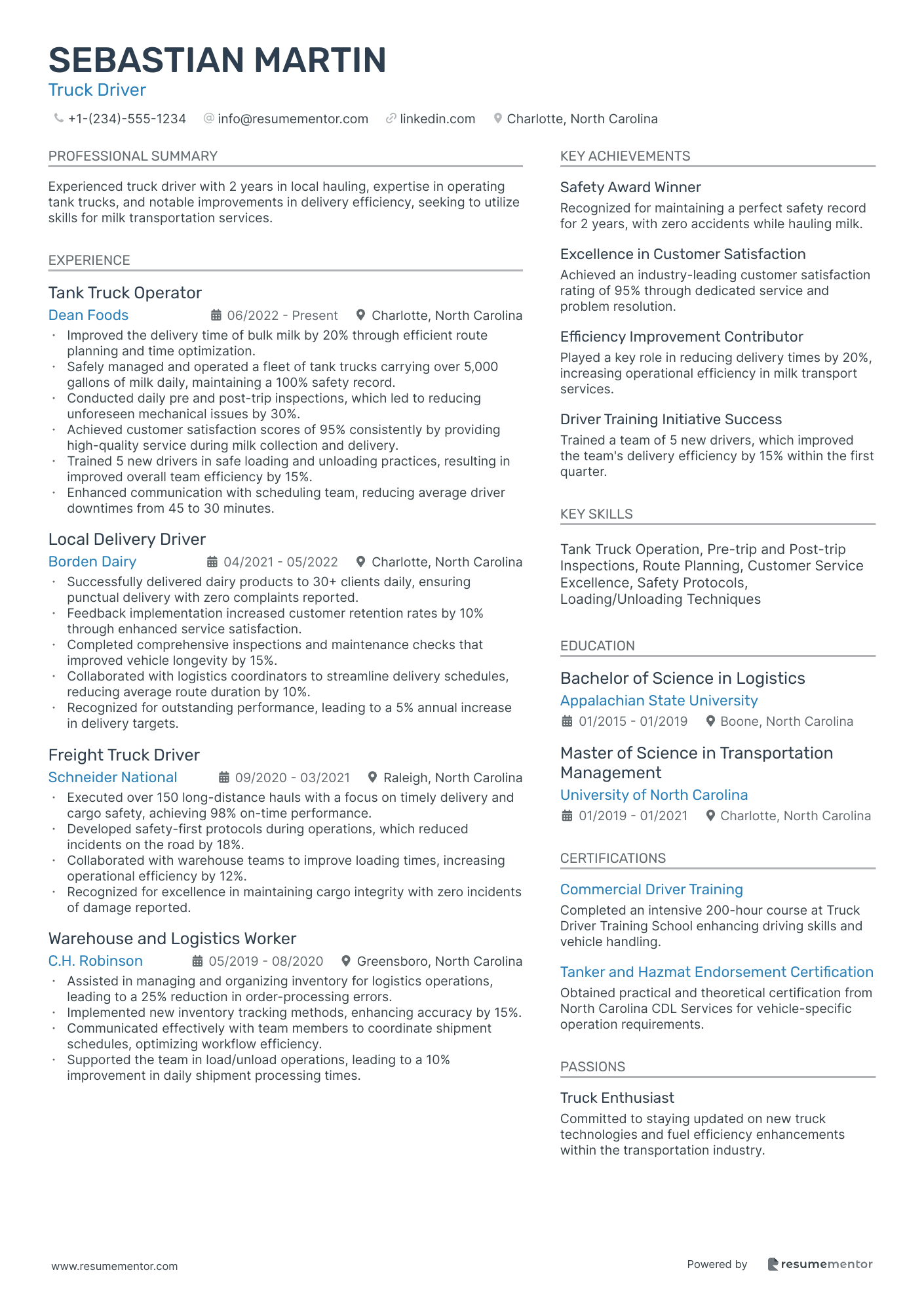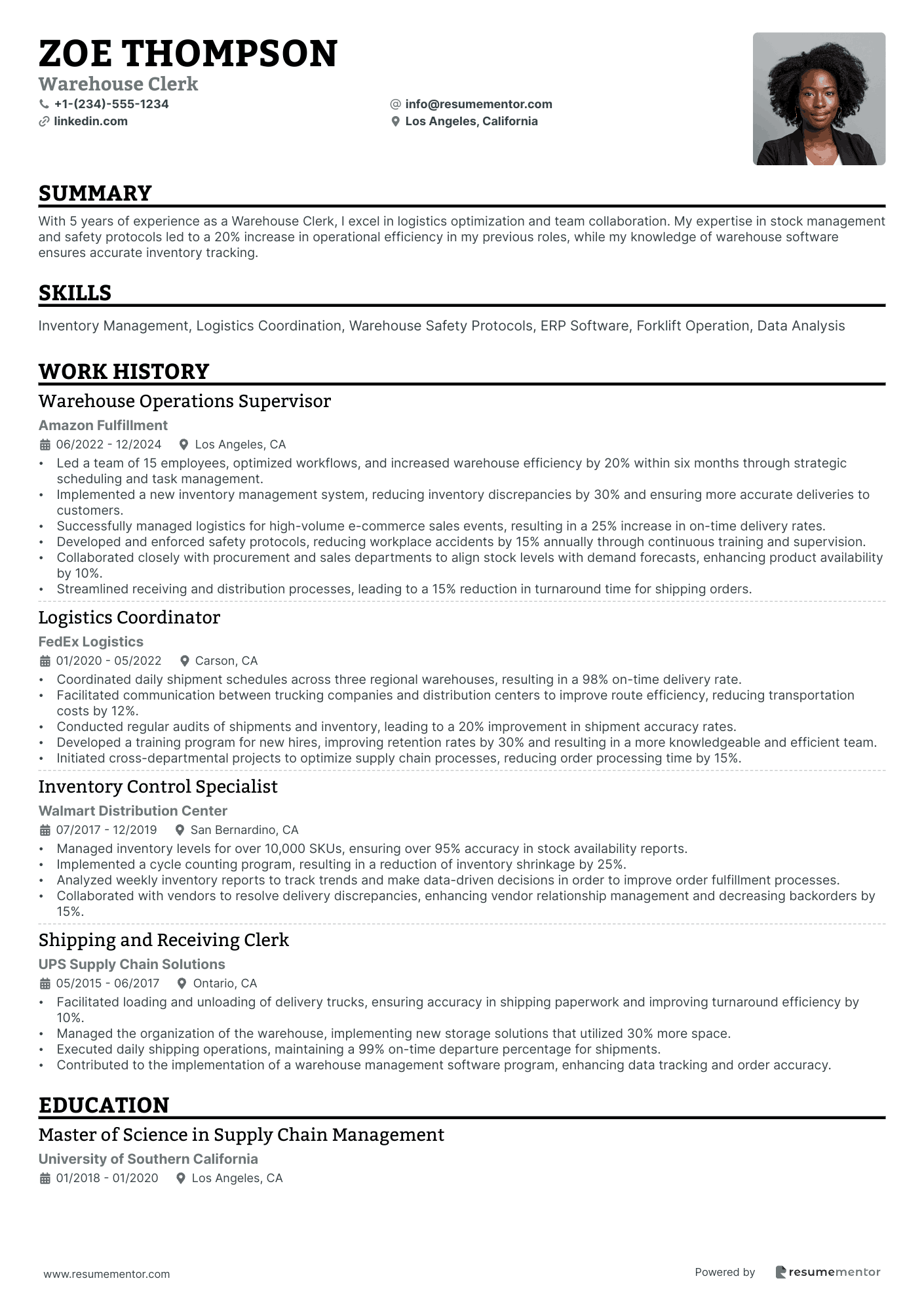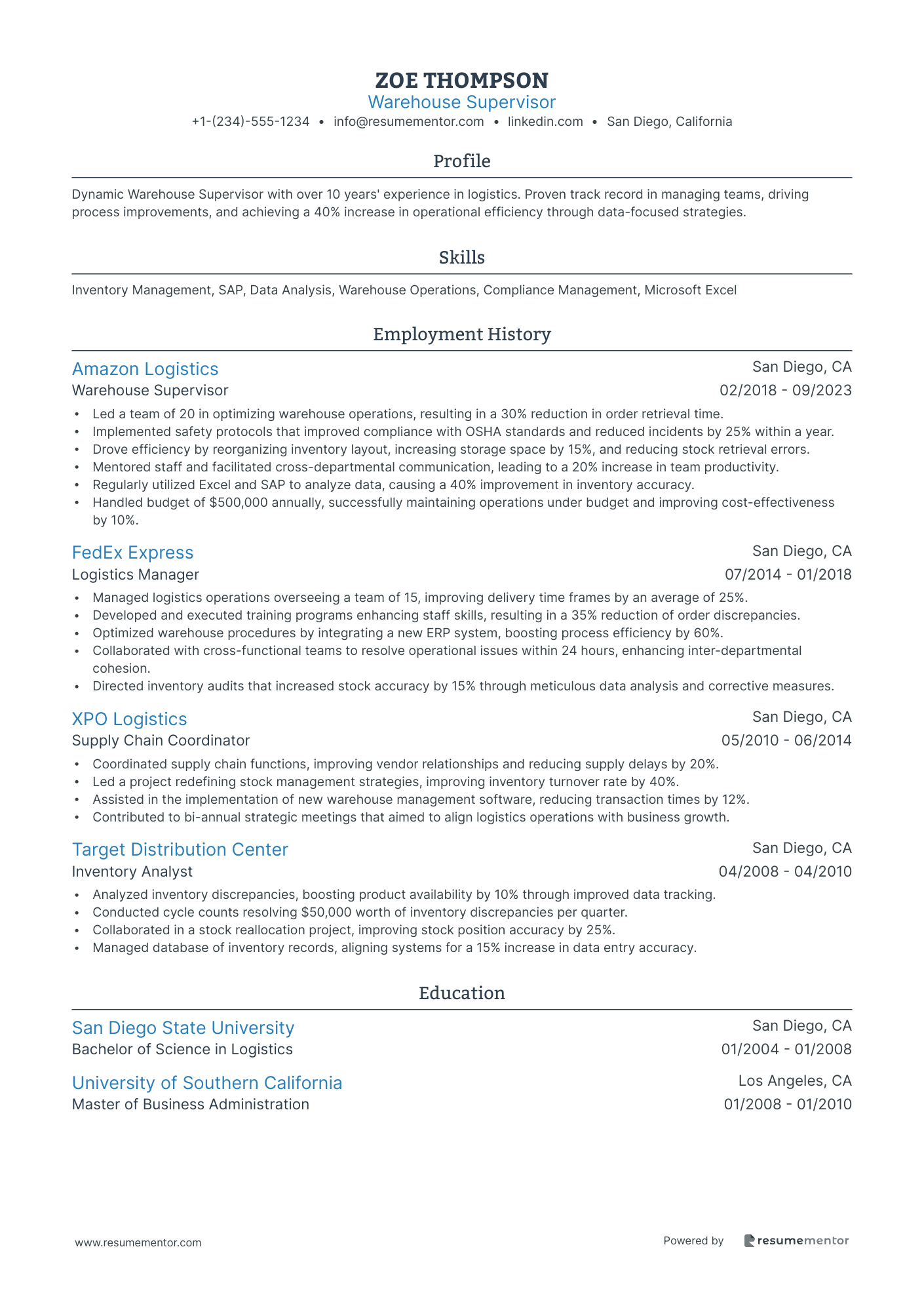Logistics Resume Examples

Mar 13, 2025
|
12 min read
Craft a logistics resume that delivers results by showcasing your organizational skills and experience. Make your application process as smooth as your supply chain management, so you can ship that job offer your way!
Rated by 348 people

Cargo Handler resume sample
- •Overhauled warehouse inventory systems, reducing missing items by 30% and improving overall efficiency for inventory checks.
- •Coached team members on new procedures, resulting in a 25% increase in loading efficiency for outbound shipments.
- •Led a safety protocol review team, enhancing adherence to safety regulations and reducing incidents by 15% in six months.
- •Implemented a new scanning and tracking system improving inventory movement accuracy by 40% across the warehouse.
- •Managed the operation of forklifts and pallet jacks, efficiently processing shipments accounting for weekly outputs of 2,000+ units.
- •Participated in collaborative workshops to improve inventory turnaround, resulting in a 20% quicker order processing time.
- •Streamlined product handling protocols, significantly reducing bottlenecks and improving delivery times by 15%.
- •Executed daily equipment inspections, contributing to maintenance record improvements and machinery uptime by 18%.
- •Reduced order errors by 25% through the implementation of a double-check system in product selection and packing.
- •Collaboratively reduced packing time by 20% through efficient team coordination and task management.
- •Contributed to a special project that analyzed logistics data, identifying optimization strategies that increased productivity by 10%.
- •Operated sit-down forklifts for a wide range of warehouse tasks contributing to the timely processing of shipments.
- •Maintained a 95% safety record by strictly following operational guidelines and conducting regular safety checks.
- •Enhanced workflow efficiency by introducing a new equipment maintenance schedule that minimized downtime.
- •Coordinated with cross-functional teams, effectively handling an average of 500 orders weekly with minimal mistakes.
- •Executed precise material movements, significantly reducing order turnaround time for high-demand periods.
- •Initiated a material tracking project, enhancing accountability, and reducing waste by 15%.
- •Achieved a perfect safety compliance score during annual reviews through diligent safety policy adherence.
- •Unloaded and sorted an average of 1,500 packages daily with a focus on minimizing handling errors.
Dispatcher resume sample
- •Successfully streamlined scheduling operations, leading to a 15% reduction in service time and increased customer satisfaction.
- •Coordinated daily over 100 inspection schedules, ensuring accurate field staff assignment and maximizing operational efficiency.
- •Implemented a new forecasting system that improved dispatch accuracy, resulting in a 20% reduction in errors and unnecessary costs.
- •Collaborated directly with IT and administrative teams to enhance scheduling software features, boosting dispatch speed by 25%.
- •Guided team efforts in implementing customer feedback loops, elevating client retention rates by 10% over six months.
- •Trained junior staff in best scheduling practices, improving team productivity by 30% in the first quarter of 2023.
- •Oversaw logistics operations, increasing delivery efficiency by 20% through strategic route planning and real-time scheduling.
- •Managed a team of dispatchers to coordinate 150+ daily operations, achieving a 95% on-time delivery rate consistently.
- •Developed reporting tools that provided actionable insights, enhancing operational decision-making and reporting accuracy by 40%.
- •Pioneered a cross-departmental communication protocol which improved coordination and reduced scheduling conflicts by 50%.
- •Enhanced client service experience by promptly addressing scheduling issues, achieving a perfect client satisfaction score over 12 months.
- •Created and optimized operational schedules for a 24/7 workforce, increasing resource utilization by 18% year-over-year.
- •Executed real-time adjustments to schedules, ensuring rapid response to unexpected changes and maintaining service reliability.
- •Played a pivotal role in integrating new dispatch software, enhancing scheduling precision and decreasing errors by 15%.
- •Continuously liaised with customer support teams to resolve scheduling conflicts quickly, maintaining high service standards.
- •Assisted in crafting daily inspection schedules, supporting a 10% improvement in routing efficiency.
- •Collaborated with inspectors to match skillsets to appropriate tasks, reducing operational backlog by 12%.
- •Provided administrative support, ensuring accurate documentation and prompt communication with all stakeholders.
- •Supported team in troubleshooting scheduling software issues, facilitating a 90% software uptime.
Distribution Coordinator resume sample
- •Managed a team of 15 logistics personnel, optimizing warehousing procedures, reducing overhead costs by 8% annually.
- •Implemented a new inventory tracking system, resulting in a 25% improvement in order accuracy and fulfillment speed.
- •Developed vendor relationships that resulted in cost savings of $250,000 year-over-year.
- •Coordinated supply chain logistics to maintain stock levels at 5 distribution centers, improving overall service efficiency by 20%.
- •Streamlined warehouse operations, reducing operational bottlenecks and enhancing delivery schedules.
- •Collaborated with cross-functional teams to forecast demand accurately, achieving a 94% on-time delivery rate.
- •Led logistics projects, resulting in a 15% increase in distribution efficiency over a one-year period.
- •Coordinated daily shipments and handled returns, balancing inventory to ensure a 98% fill rate.
- •Reduced shipping costs by analyzing vendor rates, saving the company $150,000 annually.
- •Improved communication processes with vendors, enhancing delivery timelines by 20%.
- •Assisted in developing strategic roadmaps for supply chain improvement, enhancing inventory accuracy by 30%.
- •Supervised a team of 20 associates, improving shipping/receiving procedures and increasing productivity by 12%.
- •Monitored inventory levels closely, implementing practices that reduced discrepancies by 18%.
- •Facilitated staff training on new inventory systems, improving staff productivity by 25%.
- •Conducted regular audit assessments on warehouse processes, decreasing error rates significantly.
- •Analyzed data to forecast inventory demands effectively, contributing to a 20% increase in accuracy.
- •Developed and implemented inventory optimization programs, reducing waste and improving turnover by 15%.
- •Collaborated with supply chain managers to refine logistics strategies, enhancing supply chain effectiveness.
- •Assembled reports to support management decision-making processes, influencing strategic inventory planning.
Distribution Manager resume sample
- •Led a team of 350 warehouse employees to achieve a 99.9% order accuracy rate, enhancing customer satisfaction year-over-year.
- •Implemented a safety training program that reduced incident rates by 25%, improving overall workforce safety awareness.
- •Streamlined inbound and outbound logistics processes, cutting average order processing time by 15% within first 6 months.
- •Collaborated with cross-functional teams to integrate cutting-edge inventory management technologies, leading to a 30% improvement in efficiency.
- •Managed expectations and KPI delivery, resulting in the warehouse achieving 'Top Performing Center' for two consecutive years.
- •Spearheaded an initiative for sustainability, reducing waste production by 10% through optimized packaging solutions.
- •Supervised the day-to-day operations of a 250-employee distribution center, maintaining a consistent 98.7% on-time shipment rate.
- •Enhanced operational workflows, leading to a 12% increase in throughput while reducing overtime by 35%.
- •Developed and executed a continuous improvement strategy, achieving a 20% increase in productivity across departments.
- •Played a key role in the design and implementation of a new warehouse layout, resulting in a 15% increase in capacity utilization.
- •Successfully led a project to upgrade the warehouse management system, which reduced errors and enhanced efficiency.
- •Directed a support team responsible for maintaining 98% inventory accuracy during periods of high demand.
- •Reduced shipping lead time by 20% through the implementation of advanced forecasting techniques.
- •Mentored and developed over 150 employees, guiding them through roles of higher responsibility.
- •Conducted detailed root-cause analyses on operational bottlenecks, leading to a 25% decrease in process inefficiencies.
- •Coordinated logistics for inbound products, achieving a 97% on-time delivery performance metric.
- •Implemented cost-saving measures that reduced transportation expenses by 10% within the first year.
- •Collaborated with vendors and clients to optimize logistics solutions, maintaining strong professional relationships.
- •Improved inventory turnover frequency by 15%, facilitating better stock management and more frequent restocking events.
Expeditor resume sample
- •Coordinated between kitchen and waitstaff to ensure correct dishes were delivered to over 150 patrons per day, enhancing overall dining experience.
- •Implemented a new tracking system that reduced order errors by 25%, resulting in increased customer satisfaction.
- •Provided training to new servers on proper expediting procedures, leading to a 15% improvement in order accuracy.
- •Worked closely with chefs to finalize dish presentation, ensuring high-quality standards were consistently met.
- •Played key role in daily operations leading to 10% increase in table turnover rate by optimizing processes.
- •Regularly communicated with kitchen staff, reducing delays and maintaining a steady flow of dishes to tables.
- •Delivered meals to customers in a timely manner, maintaining a 98% on-time delivery rate.
- •Assisted with expediting duties during peak hours, streamlining order process and reducing wait times by 20%.
- •Managed special requests for up to 10 high-profile customers per shift, ensuring personalized dining experiences.
- •Fostered communicative environment between waitstaff and kitchen, resulting in improved service collaboration.
- •Ensured compliance with health and safety standards, contributing to audit success with zero violations.
- •Provided attentive service to an average of 60 guests per shift, leading to high customer satisfaction scores.
- •Assisted in the training of new staff members, improving team effectiveness and reducing turnover rate by 12%.
- •Consistently upsold menu items, increasing average check size by 15% through effective communication techniques.
- •Resolved customer complaints promptly, maintaining a high return customer rate and loyalty.
- •Maintained cleanliness and organization in service areas, ensuring compliance with health and safety standards.
- •Supported kitchen staff by efficiently preparing food orders during peak hours, enhancing service delivery.
- •Contributed to team initiatives resulting in improved customer service scores.
- •Assisted with inventory management, ensuring availability of essential supplies by forecasting demand.
Export Manager resume sample
- •Spearheaded logistics optimization efforts, reducing shipping costs by 30% while maintaining service delivery quality and timelines.
- •Implemented a new ERP system, resulting in accurate documentation processes and 25% efficiency increase in daily operations.
- •Directed an export team of 10, providing strategic guidance that led to a 20% increase in on-time delivery performance.
- •Developed and maintained relationships with 50+ international clients, significantly enhancing customer satisfaction scores by 15%.
- •Led efforts to ensure compliance with international trade regulation, achieving a 100% approval rate with no penalties from foreign customs.
- •Streamlined coordination between production and warehouse teams which improved inventory management processes by 20%, aligning shipments with client needs.
- •Managed documentation and customs formalities for exports, improving processing speed by 35%.
- •Negotiated vendor contracts, reducing logistical expenses by 18% through effective partnerships with carriers and third-party providers.
- •Coordinated export operations across multiple regions, leading to a 50% growth in international trade coverage for our client base.
- •Organized training sessions that increased team efficiency by 22% in handling export procedures and documentation preparation.
- •Assisted in the development of budget plans and implemented cost reduction measures that lowered logistics spending by 12% annually.
- •Supervised logistics operations, achieving a significant improvement in delivery times, reducing delays by 40%.
- •Successfully implemented a new logistics tracking system, enhancing shipment tracking accuracy and client visibility into deliveries.
- •Collaborated with production and sales teams to align export schedules, improving customer satisfaction rates by integrating customer feedback.
- •Identified process bottlenecks, introducing process improvements that elevated overall logistics performance by 25%.
- •Coordinated shipments for clients, ensuring compliance with international trade laws and tariffs with zero compliance issues.
- •Worked closely with production teams to align export schedules, improving shipment reliability and reducing accident rates by 10%.
- •Facilitated custom clearance with an average time reduction of 20%, ensuring timely delivery to international destinations.
- •Monitored service levels of third-party logistics, maintaining high-quality standards without service failures.
Fleet Manager resume sample
- •Led a team of 15 technicians in reducing vehicle downtime by 30% through rigorous preventive maintenance strategies.
- •Implemented cost-saving measures in the fleet maintenance protocol, saving the company over $150,000 annually.
- •Enhanced safety compliance by overseeing a comprehensive safety audit, resulting in a 40% decrease in workplace incidents.
- •Developed a new scheduling system for vehicle maintenance, improving service efficiency by 25% across all operations.
- •Collaborated with external vendors to improve the quality and speed of repairs on specialized equipment and vehicles.
- •Monitored and ensured all vehicles met DOT regulations, increasing the compliance rate to 98% within the organization.
- •Overhauled the fleet management system, increasing overall efficiency by 20% and reducing costs by $200,000 yearly.
- •Led a cross-functional team of 25, successfully improving communication and work processes for better operational outcomes.
- •Developed training programs that increased technician productivity by 15% and improved repair quality assurance standards.
- •Maintained customer satisfaction scores above 90% by addressing client needs and optimizing fleet operation services.
- •Coordinated maintenance schedules with 10 external vendors, which resulted in a 50% increase in repair turnaround time.
- •Managed a team of 10 mechanics to drive a 25% improvement in vehicle reliability by enhancing maintenance procedures.
- •Introduced analytics tools to track and improve repair time, cutting the average downtime by 15%.
- •Monitored fleet inventory and replaced outdated equipment, reducing operational costs by $50,000 annually.
- •Facilitated monthly workshops on safety practices, reducing safety incidents by 30% in the first year.
- •Supervised daily operations of a 20-vehicle fleet, ensuring all vehicles adhered to safety and quality standards.
- •Improved the fleet's preventive maintenance program, decreasing unscheduled maintenance events by 40%.
- •Trained junior mechanics, enhancing skill levels across the team and raising the department's productivity by 10%.
- •Collaborated with the procurement team to streamline part ordering, reducing delivery times by 20%.
Forklift Operator resume sample
- •Ensured precise handling of over 15,000lbs of materials per shift, enhancing team efficiency by 30%.
- •Streamlined truck loading processes, resulting in a 25% reduction in operation time over a 3-month period.
- •Led training sessions for new employees on forklift safety protocols, achieving zero accidents in a year.
- •Identified and repaired minor forklift issues, reducing equipment downtime by 20% through regular inspections.
- •Collaborated with cross-functional teams to move bulky materials, improving project timelines by 10%.
- •Enhanced load capacity calculations, boosting overall accuracy and reducing load errors by 15%.
- •Performed daily equipment inspections, identifying faults early and reducing repair costs by 15% annually.
- •Managed logistics for construction materials, optimizing storage and movement to decrease loss by 8%.
- •Coordinated with crane operators to facilitate complex lifting tasks, supporting project completion on time.
- •Executed high-volume orders accurately, ensuring timely delivery and maintaining a 95% on-time rate.
- •Assisted in the development of load charts, enhancing operation safety and compliance with standards.
- •Loaded and unloaded materials with precision, improving supply chain efficiency by over 20%.
- •Implemented a new maintenance check system for forklifts that improved safety standards by 30%.
- •Organized the warehouse layout to enhance accessibility, cutting retrieval times by 15% on average.
- •Enhanced job site cleanliness and safety by establishing zones, reducing clutter complaints by 50%.
- •Assisted in heavy lifting and equipment operation, directly supporting daily construction milestones.
- •Contributed to team meetings to discuss operational improvements, implementing ideas that reduced lifting delays by 10%.
- •Adhered to safety protocols, maintaining an incident-free project site for over two years of operations.
- •Supported inventory management, ensuring materials were optimally used, cutting waste by 5%.
Freight Broker resume sample
- •Expanded client base by 25% in two years, primarily through strategic networking and leveraging existing client relationships.
- •Implemented CRM analytics, resulting in a 40% improvement in customer interaction efficiency and overall satisfaction.
- •Led a team in optimizing carrier selection processes, decreasing operational costs by 15% year-over-year.
- •Consistently exceeded monthly sales targets by an average of 20%, demonstrating strong negotiation and sales skills.
- •Spearheaded a project to integrate AS400 software for transaction and shipment records, reducing errors by 30%.
- •Enhanced monitoring systems for shipment tracking, resulting in a 50% reduction in delivery disputes.
- •Secured competitive carrier rates through high-impact negotiations, achieving an average cost savings of 10%.
- •Enhanced customer satisfaction by creating solution-focused strategies tailored to individual freight needs.
- •Utilized CRM systems to streamline customer relationship management, improving retention rates by 30%.
- •Collaborated with internal teams to ensure seamless operational flow, maintaining a 98% on-time delivery rate.
- •Monitored industry trends and adapted strategies, contributing to a 15% growth in revenue.
- •Coordinated dispatch activities and optimized routing, enhancing delivery efficiency by 20%.
- •Facilitated successful communication between shippers and carriers, improving transaction transparency.
- •Implemented a dispatch monitoring system that improved response time to shipment issues by 35%.
- •Contributed to the team’s achievement of a record-high customer satisfaction score in 2016.
- •Managed daily freight operations ensuring timely pickups and deliveries as per client schedules.
- •Negotiated contract terms with carriers, achieving cost-effective service solutions.
- •Improved freight documentation processes, reducing manual paperwork errors by 25%.
- •Supported internal teams with up-to-date shipment information, enhancing project reliability.
Freight Coordinator resume sample
- •Led a team of 8 to ensure efficient scheduling and dispatching of over 100 daily freight shipments, leading to a 20% increase in on-time deliveries.
- •Successfully negotiated and managed contracts with third-party hauling services, resulting in a 15% reduction in transportation costs within one year.
- •Implemented a new driver log digital system ensuring 100% DOT compliance and increasing data accuracy by 30%.
- •Reviewed, analyzed, and improved logistics routes, which enhanced truck utilization rates by 25% over two years.
- •Facilitated monthly meetings to address personnel and equipment issues timely, reducing maintenance costs by $50,000.
- •Handled driver performance counseling and safety briefings, decreasing incident rates by 10% annually.
- •Managed and optimized dispatch schedules for 50+ drivers, resulting in a 15% improvement in fleet efficiency.
- •Collaborated with cross-functional teams to evaluate and fulfill logistics requirements, reducing delivery time by over 30%.
- •Spearheaded the implementation of KPI monitoring systems improving operational reporting and decision-making processes.
- •Negotiated supplier contracts that aligned with financial goals, achieving an 18% decrease in excess shipping expenses.
- •Optimized routes based on real-time data, saving an average of $20,000 yearly in fuel costs.
- •Performed comprehensive cost-benefit analysis for transportation methods leading to strategic recommendations that saved $40,000 annually.
- •Managed a portfolio of logistics projects with a focus on efficiency, increasing productivity by up to 30% in key areas.
- •Streamlined reporting processes, reducing report generation time by 50% through automation and new software integration.
- •Developed transportation strategies that aligned with business objectives, resulting in improved client satisfaction scores by 20%.
- •Coordinated logistics for over 200 freight movements weekly, ensuring on-time departures and arrivals.
- •Communicated effectively with drivers to relay critical dispatch instructions and modify plans to meet real-time needs.
- •Maintained detailed logs ensuring 100% compliance with transportation regulations and corporate policies.
- •Executed regular maintenance schedule audits on fleet vehicles, directly contributing to reduced downtime by 25%.
Import-Export Clerk resume sample
- •Managed import-export documentation, contributing to a 15% increase in shipment accuracy by implementing a new verification process.
- •Coordinated with international clients through regular follow-ups, enhancing customer satisfaction scores by 10% within six months.
- •Reviewed CBP transmissions, successfully reducing errors by 25% through thorough procedural checks and audits.
- •Implemented an efficient ISF and Customs Clearance filing system, improving compliance rate by 30% resulting in minimized penalties.
- •Designed a comprehensive carrier assignment process, increasing delivery timeliness by 18% across multiple routes.
- •Established a system for monitoring crossing within the network, cutting transit delays by 12% in one year.
- •Executed strategic planning and route optimization for international shipments, boosting efficiency by 20% through effective data analysis.
- •Facilitated seamless customer interactions and achieved a 95% positive feedback rating by resolving shipment concerns promptly.
- •Developed a detailed reporting protocol for shipment payments, ensuring complete regulatory compliance and 100% payment recording.
- •Succeeded in designing and teaching an ERP training program for new hires, increasing employee proficiency by 50% within three months.
- •Spearheaded a cross-functional team to tackle shipment inconsistencies, resulting in a 15% improvement in shipment delivery times.
- •Oversaw export documentation processes, ensuring compliance with international regulations and decreasing processing times by 18%.
- •Partnered with Customs Brokers to refine clearance procedures, reducing error rates by 10% and enhancing overall customs compliance.
- •Channeled customer feedback into actionable improvements, achieving a 15% increase in client retention and satisfaction.
- •Drove initiatives in documenting sales terms and conditions, successfully standardizing forms across multiple departments.
- •Coordinated import logistics for high-value shipments, ensuring zero discrepancies over a 12-month period during high-pressure deadlines.
- •Worked closely with U.S. Customs Brokers, achieving a 100% on-time filing rate for ISF and customs clearance.
- •Performed in-depth legal reviews of import-export documentation, reducing non-compliance incidents by 15% through proactive changes.
- •Assisted in analyzing shipment data and proposed optimizations, which led to a 10% cost reduction in carrier expenses.
Inventory Control Specialist resume sample
- •Enhanced asset tracking systems, achieving a 20% increase in inventory accuracy through the integration of advanced management software.
- •Optimized logistics processes, reducing shipping and receiving delays by 25%, enhancing operational efficiency across multiple data centers.
- •Conducted comprehensive audits of IT assets, leading to the correction of data discrepancies and improved inventory reliability.
- •Collaborated with cross-functional teams to streamline resource allocation, resulting in a 15% decrease in resource wastage.
- •Developed detailed inventory reports, providing management with insights into asset utilization and supporting strategic decision-making.
- •Traveled to data centers across multiple states, ensuring consistent application of inventory controls and conducting on-site audits.
- •Implemented new logistics software, resulting in a 30% improvement in the speed of processing orders and reducing error rates.
- •Managed logistical operations across five regional data centers, ensuring seamless asset distribution and resource availability.
- •Executed data center audits, identifying and resolving inventory discrepancies and aligning records for increased accuracy.
- •Liaised with operations and procurement teams to ensure timely delivery of critical IT resources, enhancing operational uptime.
- •Generated weekly performance reports that provided upper management with actionable insights leading to strategic improvements.
- •Managed asset databases across multiple data centers, achieving a 98% inventory accuracy metric through meticulous record-keeping.
- •Coordinated asset transfers between facilities, streamlining processes which improved efficiency of asset utilization by 15%.
- •Regularly collaborated with IT and finance departments to align asset management strategies with broader organizational goals.
- •Facilitated cross-departmental audits to ensure compliance with corporate asset management policies and objectives.
- •Supported relocation projects for major data centers, resulting in a seamless transition with zero service disruptions.
- •Assessed performance metrics of asset management tools, recommending improvements that led to software updates and user training.
- •Partnered with vendors for efficient procurement processes, decreasing lead times by 20% and reducing shortages of essential equipment.
- •Created and maintained extensive documentation for data center asset inventories, supporting operational continuity and transparency.
Logistics Analyst resume sample
- •Managed and monitored 10+ property books across various CONUS and OCONUS sites, improving asset accountability by 17%.
- •Led yearly asset inventory audits for 15+ sites nationwide, resulting in a 95% accuracy rate in asset tracking.
- •Successfully completed FLIPLs with detailed investigations, reducing asset loss incidents by 12%.
- •Gained proficiency in DPAS, streamlining equipment disposition to reduce processing time by 25%.
- •Coordinated the transfer and turn-in of 200+ equipment units per year through DPAS, achieving efficient, traceable transactions.
- •Authored over 30 property accountability memos for discovered assets, restoring over $250,000 in previously lost property.
- •Established and maintained strategic relationships with 30+ contacts across diverse sites, enhancing communication and efficiency.
- •Conducted comprehensive asset audits, which improved inventory accuracy and reduced discrepancies by 22%.
- •Led a team in writing property accountability reports for over 50 suspected loss cases, recovering $180,000 in assets.
- •Utilized DISA forms for asset management, ensuring 100% compliance with all procedural standards.
- •Organized and updated monthly property custodian presentations, enhancing team understanding and responsibility.
- •Supported logistics operations by documenting and processing over 100 transfers with precision.
- •Coordinated the installation and de-installation of equipment, ensuring orderly transitions and system updates.
- •Completed and submitted weekly activity reports, showcasing operational insights and strategic improvements.
- •Ensured timely and accurate updates to the DPAS, maintaining asset integrity.
- •Monitored inventory levels across multiple locations, improving supply chain efficiency by 10%.
- •Assisted in thorough investigation and documentation of asset losses, reinforcing asset protection protocols.
- •Played a key role in organizing training sessions, improving team knowledge of asset management systems.
- •Contributed to asset recovery efforts that successfully located and returned $50,000 in equipment.
Logistics Coordinator resume sample
- •Led a team to revamp supply chain processes, resulting in a 30% increase in delivery punctuality over one year.
- •Collaborated with international freight carriers to introduce more efficient shipping routes, achieving a 15% reduction in transit times.
- •Implemented new ERP system for logistics operations, improving data accuracy and reducing errors by 40%.
- •Oversaw daily logistics communication with 3PL providers, resulting in a 20% improvement in client satisfaction scores within a quarter.
- •Developed comprehensive training materials that elevated team competency, reducing onboarding time by 50%.
- •Spearheaded monthly cross-functional meetings to address operational hurdles, enhancing company-wide logistics strategy transparency.
- •Coordinated over 500 domestic and international shipments monthly, maintaining a 98% on-time delivery record.
- •Streamlined customs paperwork processes, cutting administrative overhead by 10% and reducing processing times.
- •Negotiated contracts with freight carriers to secure cost-effective shipping rates, lowering logistics costs by 5% annually.
- •Led the initiative to digitalize shipping documentation, improving workflow efficiency by 35%.
- •Conducted weekly logistics audits to ensure compliance with international shipping regulations, maintaining a clean audit record.
- •Optimized stock monitoring processes, thereby reducing stock discrepancies by 20% across distribution centers.
- •Facilitated communication between internal teams and external shipping agents, achieving a 90% satisfaction rate in client feedback surveys.
- •Improved shipment tracking mechanisms, enhancing real-time shipment visibility and reducing customer inquiries by 25%.
- •Analyzed and improved transportation routes leading to a 15% reduction in kilometers traveled annually.
- •Assisted in coordinating domestic shipments, supporting a 10% increase in seasonal delivery capacity.
- •Maintained accurate shipment records and data-entry, achieving a 95% error-free rate on shipping invoices.
- •Worked alongside senior logistics team to scrutinize and resolve shipment delays, improving delivery reliability by 15%.
- •Contributed to weekly logistics strategy meetings, proposing improvements that enhanced overall operational processes.
Logistics Engineer resume sample
- •Led a team of 12 logistics professionals in multiple field operations, increasing operational efficiency by 25% over 2 years.
- •Implemented a new logistics tracking system that reduced delivery errors by 15% and increased customer satisfaction scores.
- •Coordinated international contracts with vendors across Europe, resulting in a 10% cost reduction through negotiation and strategic sourcing.
- •Established calibration protocols for equipment used in global deployments, maintaining compliance with international standards.
- •Managed logistics for training programs in Southeast Asia, overseeing logistics sequences that increased training throughput by 35%.
- •Initiated development of logistics handbooks, enhancing the standardization of processes and improving training efficiency by 18%.
- •Facilitated integration of logistics strategies into R&D projects, resulting in a 20% reduction in project lead times for new deployments.
- •Analyzed and documented logistics support sequences to optimize supply chain processes, enhancing efficiency by 30%.
- •Collaborated with international teams in Africa to implement improved logistical practices, leading to a 10% decrease in overall costs.
- •Oversaw logistics support for high-value defense contracts, ensuring compliance with U.S. Department of Defense requirements.
- •Developed comprehensive logistics plans for large-scale projects, coordinating with division heads to ensure timely delivery of all components.
- •Directed logistics operations for multi-national projects, increasing logistical cohesion across cross-functional teams by 40%.
- •Managed a $5M budget successfully, maintaining cost efficiency while achieving project objectives without financial overruns.
- •Streamlined logistics protocols, decreasing delivery times by 15% through innovative scheduling and resource allocation.
- •Improved logistics documentation accuracy by implementing a new review process, resulting in a 25% reduction in errors.
- •Gathered and analyzed logistic data for product life cycle management, ensuring data-driven decision-making and process improvement.
- •Collaborated with cross-functional teams to draft logistic requirements, enhancing coordination by 15% in deployment schedules.
- •Implemented logistics databases that improved access to logistics data, resulting in faster response times by 20% during operations.
- •Supported procurement initiatives by analyzing part standardization, facilitating a 10% reduction in redundant inventory.
Logistics Planner resume sample
- •Led a team to improve logistics processes, resulting in a 25% reduction of lead times for project deliveries over one year.
- •Developed and implemented logistics planning strategies, enhancing operational capabilities by up to 30% for major projects.
- •Coordinated deployment planning to ensure the availability of vital maintenance resources, enhancing operational readiness by 20%.
- •Collaborated with cross-functional teams to identify and integrate emerging logistics tools, improving data accuracy by 35%.
- •Managed high-value analysis projects that provided stakeholders with actionable insights, boosting strategic decision-making efficiency.
- •Maintained strong relationships with program managers, achieving a 95% satisfaction rate in stakeholder engagement surveys.
- •Assessed and enhanced logistical operations, achieving a 15% cost reduction across multiple departments through strategic resource allocation.
- •Developed logistics staff estimates for major deployments, ensuring seamless integration into operational plans with zero delays.
- •Identified operational use cases for logistics enhancements, resulting in an 18% increase in workflow efficiency for field operations.
- •Coordinated access to critical logistics data for cross-department collaborations, streamlining data retrieval by 40%.
- •Provided analytical support during high-stakes exercises, contributing to mission success through tactical adjustments and data-driven decisions.
- •Streamlined supply chain processes, reducing bottlenecks and improving logistics efficiency by 22% in under 12 months.
- •Identified key areas for logistics capability enhancements, implementing improvements that elevated project outcomes significantly.
- •Coordinated logistics support for international projects, ensuring timely delivery and compliance with global standards and regulations.
- •Facilitated logistics training sessions for new team members, increasing operational readiness by equipping staff with vital skills.
- •Directed logistics operations for key defense contracts, maintaining above 90% operational efficiency consistently.
- •Enhanced logistics communication systems, reducing miscommunications and errors by 50% within six months of implementation.
- •Developed comprehensive logistics frameworks that supported projects involving complex transportation and supply challenges effectively.
- •Oversaw logistics data analysis to recognize patterns, providing insights that facilitated improvements in logistical planning processes.
Materials Manager resume sample
- •Led a team of 15 in improving warehouse organization, increasing efficiency by 20% within one year.
- •Collaborated cross-functionally with engineering and production teams to reduce material waste by 15%.
- •Implemented an ERP system upgrade that improved inventory accuracy by 30% and reduced errors.
- •Negotiated with 10+ suppliers to secure contracts saving the company $500,000 annually.
- •Developed a training program for new hires that decreased onboarding time by 25%.
- •Managed cycle counts, achieving an inventory variance reduction from 10% to 2%.
- •Streamlined supply chain processes, resulting in a 16% increase in delivery timeliness over two years.
- •Supervised purchasing strategies that led to a cost reduction of $200,000 annually.
- •Spearheaded the use of Lean principles in the workflow, enhancing productivity by 12%.
- •Enhanced supplier accountability, improving overall quality compliance by 18 percentage points.
- •Optimized raw material planning, decreasing lead times by 20% and maintaining 98% stock availability.
- •Managed inventory data collection processes, reducing discrepancies by 25% through stringent controls.
- •Enabled cross-department collaboration, leading to a 10% reduction in material holding costs.
- •Initiated a vendor performance improvement program, enhancing supplier performance by 15%.
- •Led a project that reduced obsolete material by 30% via data-driven decision making.
- •Conducted market analysis resulting in $100,000 savings in material procurement annually.
- •Coordinated with logistics to achieve a 15% reduction in delivery lead times.
- •Enhanced supplier relationship management, improving service levels by 10%.
- •Implemented cost-effective strategies increasing procurement savings by 7%.
Operations Manager resume sample
- •Reduced operational costs by 25% through strategic resource allocation and improvement of communication channels between HR, IT, and Finance departments.
- •Played a pivotal role in restructuring initiatives, leading to a 15% increase in operational efficiency across multiple departments.
- •Supervised financial planning activities, supporting the accounting department with a 50% reduction in overdue payouts through better financial oversight.
- •Collaborated directly with building management, resolving leasing issues and enhancing IT infrastructure, resulting in a 30% increase in team productivity.
- •Coordinated bi-weekly training sessions for the operations team, improving skills across office management, sales, and HR sectors.
- •Implemented a new payroll management system, increasing payroll accuracy and reducing errors by 90%.
- •Led an internal budgeting project, facilitating a 20% increase in financial forecasting accuracy and improved synchronization between departments.
- •Executed monthly assessments on financial performance, aiding the CEO with key insights contributing to quarterly growth directions.
- •Optimized the organization's payroll management processes resulting in more timely disbursements of employee benefits by 2 weeks.
- •Managed external vendor relations, successfully negotiating contracts that saved the company $45,000 annually.
- •Spearheaded a cross-departmental initiative that improved organizational effectiveness by 18% through streamlined reporting and enhanced communication.
- •Directed the development and implementation of company-wide HR policies, improving employee retention by 12% through enhanced workplace culture.
- •Collaborated with senior management on financial planning, resulting in a refined budget strategy with a noticeable 15% decrease in unnecessary expenditure.
- •Consulted on office space leases and managed related negotiations, securing more favorable terms and saving costs significantly.
- •Improved HR department communication, leading to a 30% increase in employee engagement scores measured through feedback surveys.
- •Analyzed financial management systems, proposing enhancements that increased data reporting efficiency by 40%.
- •Assisted in developing long-range financial forecasts, establishing a process resulting in proactive financial preparedness.
- •Coordinated internal audits, increasing compliance with financial policies and reducing errors by 25% annually.
- •Provided consulting on matters related to tax and insurance, ensuring accurate and timely submissions and decreasing penalties by 50%.
Order Picker resume sample
- •Coordinated picking operations for over 200 daily orders, achieving 99% accuracy in labeling and shipping processes.
- •Improved efficiency by 15% through optimizing workflow and streamlining pick-list procedures, resulting in decreased processing time.
- •Mentored and trained 10 team members on inventory management practices, enhancing team productivity and morale.
- •Implemented quality assurance measures that reduced shipment errors by 20%, bolstering customer satisfaction.
- •Spearheaded audit preparations that increased inventory accuracy by 30% through meticulous tracking and documentation.
- •Streamlined materials handling by designing an innovative staging strategy that minimized space and prevented shipping errors.
- •Managed daily inventory audits, ensuring 97% accuracy across warehouse stock levels and reporting results to management.
- •Reduced discrepancies by 25% through developing a systematic labeling process, focusing on easy-to-read, distinct labels.
- •Collaborated cross-departmentally to expedite order fulfillment, cutting down delivery lead time by 2 days on average.
- •Executed returns and damages processing, effectively minimizing inventory loss through detailed reporting and analysis.
- •Participated in monthly executive meetings, providing insights that informed operational decisions and improved logistics.
- •Exceeded daily shipment targets by 10% through efficient coordination and executing precise packing methods.
- •Played a key role in fulfilling large-scale orders, contributing to a 20% increase in monthly sales volume.
- •Conducted thorough QC checks, reducing product returns by 15% through effective quality management protocols.
- •Enhanced warehouse organization by restructuring pick routes, contributing to reduced lateral movement and quicker order picking.
- •Guaranteed timely shipment of products, consistently achieving a 95% on-time delivery rate.
- •Implemented a digital filing system for shipment paperwork, improving retrieval time by 40% and enhancing accuracy.
- •Monitored equipment maintenance schedules, reducing instances of mechanical downtime by 25%.
- •Led a team of 5 in a special project increasing packing line speed by introducing lean methodologies.
Procurement Manager resume sample
- •Led global supply chain strategies, driving value on an annual spend exceeding $250M, increasing savings by 12% through strategic sourcing.
- •Established comprehensive sourcing strategies for key spends, implemented across 150+ contracts, resulting in enhanced efficiencies and reduced redundancies.
- •Collaborated with Directors and Procurement Heads on strategic initiatives, resulting in improved procurement processes and a 20% reduction in cycle times.
- •Managed the delivery of major projects, ensuring quality and timely outcomes by coordinating cross-departmental efforts for 200+ stakeholder engagements.
- •Spearheaded analytics and reporting frameworks in key responsibility areas, improving decision-making processes and outcomes by 15%.
- •Cultivated strategic supplier partnerships, enhancing competitive advantage and realizing an average yearly saving of $2M.
- •Directed procurement operations for soft and hard services, achieving a 10% cost reduction by refining supplier selection criteria.
- •Implemented 7-step sourcing processes, standardizing procurement approaches and improving contract value by 8% across 100+ suppliers.
- •Orchestrated cross-functional efforts with Finance and HR, aligning procurement actions with organizational goals, enhancing synergy by 15%.
- •Facilitated complex negotiations, securing favorable terms and enhancing vendor relationships, reducing contract disputes by 25% annually.
- •Led initiatives to streamline procurement communication, enhancing transparency and information flow, resulting in a 30% improvement in stakeholder engagement.
- •Developed innovative procurement strategies, optimizing supplier networks and achieving a 15% increase in service quality metrics.
- •Managed MRO categories, negotiating with major suppliers to decrease purchasing costs by 7% annually while maintaining service quality.
- •Drove cross-departmental collaboration, enhancing procurement operational excellence and customer satisfaction by 22%.
- •Reported directly to the Head of Procurement to refine strategic sourcing strategy, resulting in an overhaul of 20% of supplier contracts.
- •Supported category management processes, contributing to the development of long-term strategic sourcing plans and achieving a 5% decrease in costs.
- •Assisted in data analysis and operational reports, improving procurement data visibility and decision-making accuracy by 10%.
- •Liaised with multiple departments to ensure alignment on procurement objectives, enhancing coherence of procurement activities by 15%.
- •Implemented project management tools, streamlining workflow and improving project delivery timelines by 12%.
Purchasing Agent resume sample
- •Managed procurement of food supplies, improving delivery efficiency by 25% across multiple distribution centers.
- •Led a team in refining inventory management processes, reducing overstock by 30% and cutting waste.
- •Implemented a new invoice reconciliation process, resulting in a 40% decrease in reporting errors annually.
- •Facilitated supplier negotiations, contributing to a $500,000 reduction in purchasing costs per year.
- •Conducted regular training on safety standards, increasing staff compliance by 15% over one year.
- •Streamlined order workflows, increasing operational efficiency by 20%, enhancing team productivity.
- •Coordinated inventory assessments, which optimized stock levels and reduced downtime by 20%.
- •Refined processes for damaged goods returns, decreasing incidence resolution times by 25%.
- •Steered the implementation of digital record-keeping systems, improving data access speeds by 40%.
- •Collaborated closely with suppliers, enhancing rapport and ensuring timely deliveries by 95%.
- •Maintained accurate records of transaction receipts and invoices, achieving a perfect audit score.
- •Effectively managed stock levels in collaboration with the production team, saving 15% on monthly costs.
- •Established reporting standards, improving the accuracy of inventory records by 30%.
- •Monitored incoming shipments for damage, reducing product claims by 20% annually.
- •Assisted in developing training modules for new hires, enhancing their competency by 25% within three months.
- •Conducted daily supply checks, maintaining over 95% order fulfillment rate consistently.
- •Improved tracking systems, enabling precise forecasting and reducing overstocks by 10%.
- •Collaborated with key suppliers to align on delivery schedules, elevating on-time delivery rates by 15%.
- •Processed reports using specialized software, streamlining data collection and presentation.
Receiving Clerk resume sample
- •Successfully managed the receipt of over 1,000 packages monthly, ensuring 98% accuracy in documentation matching for quality assurance.
- •Streamlined the MMS system data entry process, leading to a 20% improvement in processing time and reducing errors by 15%.
- •Led a team to conduct a monthly inventory check, resulting in a significant decrease in discrepancies and improved stockroom organization.
- •Developed a delivery log protocol that improved order tracking efficiency by 25% and ensured timely deliveries.
- •Coordinated shipments with FedEx and UPS, guaranteeing that 98% of deliveries were dispatched to appropriate departments within 24 hours of arrival.
- •Implemented a stockroom management system enhancing stock levels' visibility and ensuring stockroom is neat and user-friendly.
- •Received and dispatched high-volume shipments weekly, maintaining 95% accuracy in tracking documents against delivered goods.
- •Coached junior staff on effective requisition filling leading to a 30% increase in workflow efficiency in less than a year.
- •Spearheaded an initiative to optimize stockroom space, which led to a 50% increase in capacity and improved order fulfillment times.
- •Collaborated with cross-departmental teams to optimize logistics solutions, thus reducing order processing time by 10% daily.
- •Maintained open communication with vendors to ensure a seamless receiving process, resulting in 100% adherence to delivery schedules.
- •Managed daily logistics and inventory for high-volume retail store, achieving a 20% increase in inventory accuracy annually.
- •Implemented an automated inventory tracking system, reducing manual entry errors by 40% and improving stock management.
- •Developed training materials for inventory procedures, resulting in improved standardization and efficiency across storage tasks.
- •Facilitated quarterly inventory audits, identifying and rectifying discrepancies to maintain optimal stock levels.
- •Assisted in the management and organization of inbound and outbound goods, ensuring accurate and timely deliveries daily.
- •Participated in stockroom optimization initiatives leading to a 15% increase in efficiency and better space management.
- •Prepared detailed inventory reports for management, contributing to the reduction of stock discrepancies by 25% over a two-year period.
- •Liaised effectively with transport companies, ensuring that more than 90% of shipments were processed without delay.
Route Planner resume sample
- •Utilized RoadNet to optimize route planning, achieving a 30% increase in delivery efficiency over two years.
- •Integrated backhaul strategies, improving warehouse-space utilization by 15% while ensuring compliance with DOT guidelines.
- •Analyzed route data to maximize vehicle performance, resulting in a 20% reduction in fuel costs.
- •Developed and maintained routing scheduling procedures, enhancing customer satisfaction rates by 10%.
- •Collaborated with warehouse managers to ensure timely route releases, achieving a 98% dispatch success rate.
- •Implemented real-time tracking systems, significantly improving the responsiveness to customer inquiries.
- •Managed daily route processing and special delivery scheduling, enhancing delivery punctuality by 15%.
- •Produced detailed route analysis reports, leading to a 12% increase in route efficiency.
- •Maintained compliance with DOT standards, resulting in zero non-compliance incidents during tenure.
- •Coordinated with customer service teams, reducing customer complaint rates by 8% through optimized service.
- •Executed maximum cube reviews, generating an 18% improvement in vehicle load efficiency.
- •Enhanced route structures using RoadNet, achieving a 25% improvement in fleet utilization.
- •Led projects on route efficiency, cutting delivery costs by 10% in the first year.
- •Facilitated knowledge sharing with teams across departments to foster cross-functional routing solutions.
- •Implemented new routing procedures to streamline logistic processes, resulting in notable operational improvements.
- •Designed and implemented routing schedules that decreased delivery transit times by 20%.
- •Conducted route validations and modifications that propelled a 15% efficiency improvement.
- •Promoted DOT-compliant practices, significantly reducing the risk of regulatory breaches.
- •Collaborated with logistics teams to align routes with strategic distribution goals, enhancing service deliverables.
Shipping Coordinator resume sample
- •Implemented a new EDI process, increasing order accuracy rate to 98% and reducing processing time by 35% monthly.
- •Developed and led a team training initiative that resulted in a 25% increase in team productivity over six months.
- •Streamlined shipping document preparation, cutting down time spent on manually entering data by 50%.
- •Successfully coordinated a high-volume distribution project, distributing over 500,000 units across multiple locations, improving delivery efficiency by 15%.
- •Collaborated with cross-functional teams to enhance warehouse communication, reducing shipping delays by 30%.
- •Managed key accounts with an annual revenue exceeding $5 million, maintaining customer satisfaction levels at a 95% rate.
- •Coordinated the dispatch of over 50 daily shipments, resulting in a 20% decrease in delivery times and improved customer satisfaction.
- •Executed an inventory management project, reducing stock discrepancies by 40% within a year.
- •Optimized logistic routes, which diminished transportation costs by $100,000 annually.
- •Successfully led a system upgrade project, enhancing the efficiency of invoicing and pick-order processes by 45%.
- •Increased EDI order processing speed by 60%, improving customer retention through reliable and timely service.
- •Managed day-to-day shipping operations, maintaining an on-time shipment rate of 98% across all accounts.
- •Performed detailed document preparation, improving EDI compliance which increased customer satisfaction scores by 15%.
- •Supervised a team in warehouse operations, leading to a 10% reduction in labor costs.
- •Enhanced vendor relationships through effective communication, resulting in a consistent supply chain flow and decreased re-order lead times by 20%.
- •Assisted in the implementation of a new warehouse management system, reducing errors and improving efficiency by 30%.
- •Processed over 10,000 shipping invoices, maintaining a 99% accuracy rate, which earned recognition from senior management.
- •Coordinated logistics for multiple client accounts, ensuring that all distribution centers met or exceeded performance metrics.
- •Contributed to reducing operational downtime by streamlining equipment maintenance schedules and fostering a proactive repair protocol.
Supply Chain Analyst resume sample
- •Developed a dynamic inventory model reducing excess stock by 22%, contributing to significant cost savings.
- •Implemented Tableau dashboards, resulting in improved data visualization and a 30% increase in report accuracy.
- •Collaborated with sales and operations team to enhance forecast accuracy by 18%, improving inventory turnover.
- •Automated reporting process for inventory health checks, reducing manual data entry time by 50%, increasing efficiency.
- •Conducted performance analysis leading to a 15% reduction in logistics costs through optimized transportation routes.
- •Facilitated cross-functional workshops to strategize supply chain improvement, enhancing team collaboration.
- •Enhanced demand planning accuracy by 25% through the adoption of advanced analytics tools like Power BI.
- •Reduced stockout occurrence by 20% by refining safety stock calculations across multiple SKUs.
- •Implemented a new forecasting model, improving sales alignment and reducing error rates in demand planning by 30%.
- •Led efforts in reducing obsolete inventory by 35% with strategic disposal and reallocation plans.
- •Streamlined data processes, cutting processing time for weekly reports by 40%, allowing more in-depth analysis.
- •Optimized order fulfillment processes, resulting in a 10% improvement in delivery times and customer satisfaction.
- •Monitored SKU performance and provided insights that influenced a 15% increase in sales for key product lines.
- •Identified inefficiencies in procurement processes, leading to a 12% cost reduction in supplier contracts.
- •Assisted in launching new SKUs by accurately forecasting demand, ensuring optimal inventory levels upon release.
- •Negotiated supplier contracts minimizing costs by 8% while maintaining product quality and supply reliability.
- •Managed electronic procurement system upgrade, enhancing purchasing efficiency by 20% and streamlining operations.
- •Coordinated logistics and procurement strategies that led to a 10% decrease in transport costs.
- •Supported the implementation of automated procurement reports increasing data visibility by 25%.
Supply Chain Manager resume sample
- •Orchestrated a 30% reduction in procurement costs by refining supplier negotiation strategies and optimizing order quantities, achieving key financial goals.
- •Led a team of 12 procurement specialists to manage over 150 supplier relationships, enhancing supplier performance scores by 15%.
- •Implemented a sophisticated supplier review process using KPI dashboards, resulting in proactive issue resolution and improved delivery reliability.
- •Piloted a technologically advanced ERP module integration, enhancing procurement visibility and coordination across departments.
- •Cultivated strategic partnerships and developed joint supply plans with key suppliers, leading to a 20% decrease in lead times.
- •Mentored and developed staff, fostering a culture of continuous improvement and learning, leading to the promotion of three team members.
- •Managed day-to-day procurement activities for a team of eight, achieving a procurement accuracy rate of 97%.
- •Coordinated cross-functional teams to streamline supply chain processes, resulting in a 15% increase in operational efficiency.
- •Negotiated long-term contracts with vendors that led to a 10% cost saving annually, directly impacting profitability.
- •Redesigned procurement workflows and introduced automated tools that decreased processing time by 25%.
- •Spearheaded initiatives to improve supplier compliance with company standards, yielding a 20% rise in quality outputs.
- •Executed procurement strategies that aligned with production demands, contributing to a 95% on-time delivery rate.
- •Collaborated with key suppliers to implement cost-effective sourcing solutions, achieving a 12% reduction in material costs.
- •Developed supplier performance metrics, facilitating a 10% improvement in supplier scorecard results.
- •Led negotiations on terms and conditions with vendors, securing beneficial terms while maintaining vendor relationships.
- •Assisted in developing supplier relationship management programs, enhancing engagement and collaboration with over 50 vendors.
- •Conducted detailed market analysis to identify sourcing opportunities, contributing to a 5% reduction in overall spend.
- •Processed and analyzed supply chain data, reinforcing decision-making with accurate, data-driven insights.
- •Streamlined communication channels between procurement and production teams, reducing misalignments and increasing efficiency.
Transportation Manager resume sample
- •Enhanced route efficiency by 20% through meticulous planning and collaboration with educational institutions.
- •Developed and implemented new procedures which reduced operational transport costs by 15% annually.
- •Fostered strong partnerships with external vendors, improving service reliability and satisfaction by 25%.
- •Managed daily scheduling and dispatch of 50 buses, ensuring punctual and efficient service delivery.
- •Trained and supervised over 60 drivers, increasing adherence to safety protocols by 30%.
- •Monitored and optimized maintenance schedules, resulting in 10% fewer transport delays.
- •Coordinated fleet operations for 100+ vehicles, maintaining a 95% vehicle uptime during peak periods.
- •Introduced a new driver training program, resulting in a 40% reduction in training time with higher pass rates.
- •Led a team of 40 drivers, improving team retention rates by 18% with personalized career development programs.
- •Reduced fuel consumption by 10% by implementing eco-friendly driving practices across the fleet.
- •Conducted thorough vehicle inspections, resulting in zero compliance fines over a two-year period.
- •Scheduled and managed logistics for over 30 daily routes, achieving on-time performance rates of 92%.
- •Implemented a new scheduling software, reducing scheduling errors by 50% and improving driver allocation.
- •Organized special charter trips, optimizing costs and increasing customer satisfaction scores by 25%.
- •Analyzed data to identify efficiencies, leading to process improvements and annual savings of $100,000.
- •Managed daily school bus schedules, coordinating routes for over 500 students each day.
- •Collaborated with school officials to tailor and improve route efficiency based on real-time needs.
- •Developed a communication protocol enhancing parent satisfaction by 30% through timely updates.
- •Reduced maintenance costs by 12% by proactively managing vendor relationships and maintenance schedules.
Truck Driver resume sample
- •Improved the delivery time of bulk milk by 20% through efficient route planning and time optimization.
- •Safely managed and operated a fleet of tank trucks carrying over 5,000 gallons of milk daily, maintaining a 100% safety record.
- •Conducted daily pre and post-trip inspections, which led to reducing unforeseen mechanical issues by 30%.
- •Achieved customer satisfaction scores of 95% consistently by providing high-quality service during milk collection and delivery.
- •Trained 5 new drivers in safe loading and unloading practices, resulting in improved overall team efficiency by 15%.
- •Enhanced communication with scheduling team, reducing average driver downtimes from 45 to 30 minutes.
- •Successfully delivered dairy products to 30+ clients daily, ensuring punctual delivery with zero complaints reported.
- •Feedback implementation increased customer retention rates by 10% through enhanced service satisfaction.
- •Completed comprehensive inspections and maintenance checks that improved vehicle longevity by 15%.
- •Collaborated with logistics coordinators to streamline delivery schedules, reducing average route duration by 10%.
- •Recognized for outstanding performance, leading to a 5% annual increase in delivery targets.
- •Executed over 150 long-distance hauls with a focus on timely delivery and cargo safety, achieving 98% on-time performance.
- •Developed safety-first protocols during operations, which reduced incidents on the road by 18%.
- •Collaborated with warehouse teams to improve loading times, increasing operational efficiency by 12%.
- •Recognized for excellence in maintaining cargo integrity with zero incidents of damage reported.
- •Assisted in managing and organizing inventory for logistics operations, leading to a 25% reduction in order-processing errors.
- •Implemented new inventory tracking methods, enhancing accuracy by 15%.
- •Communicated effectively with team members to coordinate shipment schedules, optimizing workflow efficiency.
- •Supported the team in load/unload operations, leading to a 10% improvement in daily shipment processing times.
Warehouse Clerk resume sample
- •Led a team of 15 employees, optimized workflows, and increased warehouse efficiency by 20% within six months through strategic scheduling and task management.
- •Implemented a new inventory management system, reducing inventory discrepancies by 30% and ensuring more accurate deliveries to customers.
- •Successfully managed logistics for high-volume e-commerce sales events, resulting in a 25% increase in on-time delivery rates.
- •Developed and enforced safety protocols, reducing workplace accidents by 15% annually through continuous training and supervision.
- •Collaborated closely with procurement and sales departments to align stock levels with demand forecasts, enhancing product availability by 10%.
- •Streamlined receiving and distribution processes, leading to a 15% reduction in turnaround time for shipping orders.
- •Coordinated daily shipment schedules across three regional warehouses, resulting in a 98% on-time delivery rate.
- •Facilitated communication between trucking companies and distribution centers to improve route efficiency, reducing transportation costs by 12%.
- •Conducted regular audits of shipments and inventory, leading to a 20% improvement in shipment accuracy rates.
- •Developed a training program for new hires, improving retention rates by 30% and resulting in a more knowledgeable and efficient team.
- •Initiated cross-departmental projects to optimize supply chain processes, reducing order processing time by 15%.
- •Managed inventory levels for over 10,000 SKUs, ensuring over 95% accuracy in stock availability reports.
- •Implemented a cycle counting program, resulting in a reduction of inventory shrinkage by 25%.
- •Analyzed weekly inventory reports to track trends and make data-driven decisions in order to improve order fulfillment processes.
- •Collaborated with vendors to resolve delivery discrepancies, enhancing vendor relationship management and decreasing backorders by 15%.
- •Facilitated loading and unloading of delivery trucks, ensuring accuracy in shipping paperwork and improving turnaround efficiency by 10%.
- •Managed the organization of the warehouse, implementing new storage solutions that utilized 30% more space.
- •Executed daily shipping operations, maintaining a 99% on-time departure percentage for shipments.
- •Contributed to the implementation of a warehouse management software program, enhancing data tracking and order accuracy.
Warehouse Supervisor resume sample
- •Led a team of 20 in optimizing warehouse operations, resulting in a 30% reduction in order retrieval time.
- •Implemented safety protocols that improved compliance with OSHA standards and reduced incidents by 25% within a year.
- •Drove efficiency by reorganizing inventory layout, increasing storage space by 15%, and reducing stock retrieval errors.
- •Mentored staff and facilitated cross-departmental communication, leading to a 20% increase in team productivity.
- •Regularly utilized Excel and SAP to analyze data, causing a 40% improvement in inventory accuracy.
- •Handled budget of $500,000 annually, successfully maintaining operations under budget and improving cost-effectiveness by 10%.
- •Managed logistics operations overseeing a team of 15, improving delivery time frames by an average of 25%.
- •Developed and executed training programs enhancing staff skills, resulting in a 35% reduction of order discrepancies.
- •Optimized warehouse procedures by integrating a new ERP system, boosting process efficiency by 60%.
- •Collaborated with cross-functional teams to resolve operational issues within 24 hours, enhancing inter-departmental cohesion.
- •Directed inventory audits that increased stock accuracy by 15% through meticulous data analysis and corrective measures.
- •Coordinated supply chain functions, improving vendor relationships and reducing supply delays by 20%.
- •Led a project redefining stock management strategies, improving inventory turnover rate by 40%.
- •Assisted in the implementation of new warehouse management software, reducing transaction times by 12%.
- •Contributed to bi-annual strategic meetings that aimed to align logistics operations with business growth.
- •Analyzed inventory discrepancies, boosting product availability by 10% through improved data tracking.
- •Conducted cycle counts resolving $50,000 worth of inventory discrepancies per quarter.
- •Collaborated in a stock reallocation project, improving stock position accuracy by 25%.
- •Managed database of inventory records, aligning systems for a 15% increase in data entry accuracy.
Navigating the world of logistics demands precision, and your resume should reflect that seamlessly. Think of your role as a moving puzzle where each piece needs to fit perfectly on paper. Capturing your expertise in managing supply chains and coordinating transportation requires a clear, organized approach.
In a crowded job market, making your resume stand out can be challenging, but it's crucial to showcase your skills and achievements effectively. To streamline the process, a well-crafted resume template can guide your information into a polished format, ensuring clarity and professionalism. By exploring these resume templates, you create a strong foundation for your logistics resume.
Using a template not only saves time but also helps you highlight your key skills without common pitfalls. Think of logistics as more than moving goods; it's also about telling your career story effectively. Your technical expertise in transportation, warehouse operations, and inventory management should be front and center, demonstrating your value.
As you build your resume, remember it's your passport to new opportunities. Present your logistics experience in a way that naturally showcases your capabilities, and you'll have employers eager to learn more about you.
Key Takeaways
- When writing a logistics resume, use a clear and organized approach to highlight your expertise in supply chain management, transportation coordination, and inventory control, while emphasizing problem-solving skills and efficiency in process optimization.
- Utilize a well-crafted resume template to effectively present your skills and achievements, using quantifiable metrics to make your impact clear to potential employers.
- The use of a chronological format, with clear and professional fonts, helps showcase your career trajectory in logistics, which is often appreciated by recruiters.
- Incorporate strong action verbs and industry-specific keywords throughout your resume to improve visibility for both hiring managers and applicant tracking systems.
- Enhance your resume with optional sections such as Certifications, Awards, Languages Spoken, Hobbies, and Interests to showcase your various skills and achievements in the logistics field.
What to focus on when writing your logistics resume
Your logistics resume should effectively communicate your problem-solving skills and efficiency in supply chain management, focusing on how you optimize processes to consistently meet delivery deadlines.
How to structure your logistics resume
- Contact Information: Start with your name, phone number, and professional email—ensuring everything is up-to-date is crucial for maintaining clear communication. Think of this section as the easy-to-find base from which a recruiter can quickly reach you, making sure there's no room for confusion.
- Objective/Summary: Follow with a compelling summary that highlights your logistics experience and problem-solving strengths, emphasizing achievements like reducing delivery times and improving order accuracy to demonstrate your value. This section serves as your elevator pitch, quickly summarizing who you are and what you bring to a logistics role.
- Work Experience: Build on this by detailing your logistics roles, including employer names, job titles, and dates—bullet points should showcase accomplishments such as enhancing fleet efficiency or overseeing large-scale distribution projects, which inherently reinforce your expertise. Use metrics wherever possible to quantify your impact, painting a clear picture of your effectiveness in past roles.
- Skills: Transition to skills, emphasizing logistics-specific areas like inventory management, transportation planning, and supply chain optimization to underline your capabilities without resorting to generic terms. Align your listed skills with those that are frequently requested in logistics job postings to ensure relevance.
- Education: Round out the essentials by listing your degrees, schools, and graduation dates—and include pertinent certifications like Certified Supply Chain Professional (CSCP) to highlight your formal qualifications. This section reveals your foundational knowledge and any special training that sets you apart from other candidates.
- Software Proficiency: Conclude with software proficiency, mentioning logistics programs like SAP, Oracle Transportation Management, or warehouse management systems to indicate your technical know-how. Your ability to leverage these tools is often key to enhancing efficiency and accuracy in logistics operations.
For a stronger impact, consider optional sections such as Certifications, Awards, or Languages Spoken. These can provide additional insight into your abilities and accomplishments. Below, we'll cover each section in more depth to help structure your resume effectively.
Which resume format to choose
Creating an impressive logistics resume is all about presenting your experience in a way that's both clear and appealing. Using a chronological format is particularly effective because it showcases your career trajectory in a linear fashion, which is something logistics recruiters appreciate as they assess your ability to handle complex tasks progressively over time.
When it comes to fonts, selecting one that balances modernity with professionalism is key. Raleway, Lato, and Montserrat are excellent choices. These fonts offer a sleek, contemporary look that complements the detailed and structured information required in a logistics resume without overwhelming the reader.
Turning your document into a PDF is essential. This format preserves your layout and design exactly as you intended, whether it’s viewed on a computer, tablet, or phone. A consistent and polished format demonstrates attention to detail, a trait that's invaluable in logistics roles where precision matters.
Lastly, keeping one-inch margins around your resume ensures that it stays neat and easy to read. This spacing aids in creating a document that's not only visually balanced but also inviting to anyone reviewing it. These thoughtful touches in your resume’s structure and appearance communicate your organizational skills and professionalism, essential qualities for a successful career in logistics.
How to write a quantifiable resume experience section
For a strong logistics resume experience section, focus on showcasing your achievements and skills in logistics with a clear narrative. Highlight your contributions by using quantifiable achievements and specific metrics, bringing clarity to your impact. Organize this section in reverse chronological order, starting with your most recent role, so potential employers immediately see your most relevant work. Typically, go back about 10-15 years to capture your key experiences while ensuring each included job title reflects relevant logistics expertise. Tailoring your resume to each job ad is crucial; analyze the job description to highlight past experiences that align with the role. Emphasize the impact of your work using action words like "streamlined," "optimized," "reduced," or "managed," which clearly convey your effectiveness.
- •Reduced transportation costs by 15% through route optimization and improved vendor negotiation.
- •Improved order fulfillment rate by 20%, achieving a 98% on-time delivery record.
- •Implemented a new inventory management system, decreasing stock discrepancies by 30%.
- •Led a team of 10 logistics coordinators, enhancing productivity by 25% through process improvements.
This experience section effectively captures what makes it stand out while creating a cohesive story that employers value. The clear statements of reducing costs and improving deliveries directly demonstrate your tangible impact. Each bullet point uses strong action words and specific metrics, ensuring your contributions are easily understood and noticeable.
The section is neatly structured, integrating important details like location and duration smoothly without any unnecessary clutter. By tailoring it to focus on relevant achievements, such as optimizing routes and implementing management systems, you show a deep understanding of what’s valuable in a logistics operation. This makes your resume not only focused but also results-driven.
Efficiency-Focused resume experience section
A logistics efficiency-focused resume experience section should clearly illustrate how your efforts have led to streamlined processes, cost savings, and productivity improvements. Start with your role and the company you worked for, then briefly outline your core responsibilities. Focus on achievements that showcase your ability to identify inefficiencies and implement solutions, highlighting specific examples with measurable outcomes. This helps to draw a clear picture of how your contributions can benefit a prospective employer.
In each bullet point, quantify your achievements with numbers, percentages, or timeframes to demonstrate the scale of your impact. This allows employers to appreciate the significance of your work. Reference any technologies or strategies you used to achieve these results, showing your proficiency with modern tools. Tailor your section to the logistics sector by emphasizing your expertise in supply chain management, route optimization, or inventory control. The key is to link your logistics skills directly to tangible efficiency gains for the organization.
Logistics Coordinator
GlobalWare Solutions
June 2019 - March 2023
- Led a team to streamline warehouse operations, decreasing order processing time by 20%.
- Implemented an inventory management system, reducing overhead costs by 15%.
- Developed a staff training program, boosting productivity by 25% within six months.
- Collaborated with suppliers to enhance delivery accuracy, cutting delays by 30%.
Customer-Focused resume experience section
A logistics-focused resume experience section should effectively highlight your ability to meet customer needs while optimizing operational processes. Begin by reflecting on specific achievements that demonstrate your role in enhancing customer satisfaction and streamlining logistics. Your descriptions should be concise and illustrate how your contributions benefited both the company and its clients. Use strong action verbs like "improved" and "developed" to convey an active role in achieving success.
When possible, quantify your accomplishments by noting improvements in delivery speed or accuracy in order processing. Tailor each bullet point to fit the logistics industry, showcasing your expertise and the tangible value you bring. By doing so, you emphasize your deep understanding of customer service in logistics, making your resume truly stand out.
Logistics Coordinator
ABC Logistics Inc.
January 2020 - March 2023
- Improved delivery times by 15% through enhanced route planning.
- Developed a new tracking system that increased customer satisfaction scores by 25%.
- Led a team of 10 in analyzing supply chain metrics, reducing errors by 20%.
- Streamlined communication processes with clients, boosting retention rates by 10%.
Project-Focused resume experience section
A logistics project-focused resume experience section should clearly highlight your skills and achievements in managing logistics-related tasks. Start by organizing your information in an easy-to-read format and use strong action words to describe your work. Each bullet point should link your responsibilities to measurable outcomes, such as cost savings or efficiency boosts, which highlight your impact. It's crucial to demonstrate your ability to solve problems and manage multiple tasks seamlessly, reflecting your strengths in this area.
By structuring your resume with a focus on logistics projects, you make it easier for potential employers to recognize your expertise. Use the JSON format to highlight your key achievements, ensuring each bullet point narrates a story of challenges faced and contributions made. Emphasize experiences that showcase your leadership, teamwork, and technical skills, connecting these elements to what you can contribute to future projects. This approach not only outlines your past accomplishments but also sets the stage for what you bring to new opportunities.
Logistics Coordinator
Supply Chain Solutions Inc.
June 2020 - Present
- Coordinated delivery schedules for over 100 shipments monthly, boosting on-time delivery by 15%.
- Implemented a new inventory management system, reducing overstock by 20%.
- Negotiated vendor contracts, achieving annual cost savings of 10%.
- Led a team of five in a warehouse redesign project, enhancing workflow efficiency.
Growth-Focused resume experience section
A growth-focused logistics resume experience section should clearly highlight your achievements and the impact you've had in the field. Begin by identifying key successes that contributed to the company's growth, such as streamlining processes, enhancing efficiency, or reducing costs. Explain how your efforts have significantly advanced logistics operations, providing benefits that align with the company’s goals. This method not only creates a strong impression but also positions you as a proactive, results-driven logistics professional.
To effectively convey your contributions, use clear and compelling bullet points. Concentrate on your primary responsibilities and achievements, with a preference for outcomes that can be measured. Use action verbs to convey energy and initiative in your roles. Keep the language straightforward to ensure that your skills and achievements are easy to understand. By adhering to these guidelines, you ensure your logistics experience stands out to potential employers, clearly demonstrating your growth-oriented mindset.
Logistics Analyst
ABC Logistics
June 2020 - Present
- Improved supply chain efficiency by 30% with a new tracking system.
- Cut delivery costs by 15% through optimized routing strategies.
- Led a team to refine warehouse organization, reducing retrieval time by 25%.
- Worked with vendors to adopt sustainable practices, decreasing waste by 40%.
Write your logistics resume summary section
A logistics-focused resume summary should make a strong first impression by highlighting your key achievements and skills. This short paragraph at the top of your resume is perfect for experienced professionals and should emphasize what you bring to potential employers. For someone with a logistics background, it might look like this:
Such a summary shows the value you bring to the table by highlighting your strong record, educational background, and clear achievements. It's important to avoid vague statements and instead, focus on being specific and showcasing tangible results. Numbers can effectively highlight your accomplishments and make your claims more convincing.
If you're just starting in the field, consider focusing on a resume objective that targets your career goals. For a balanced approach, a resume profile can blend both a summary and an objective to showcase your skills and ambitions. Alternatively, a summary of qualifications provides a concise bullet-point list of your main skills. Understanding these differences is key to tailoring your resume to your career stage. A well-crafted summary instantly grabs the recruiter's attention by emphasizing what makes you stand out and aligning with the job you're applying for.
Listing your logistics skills on your resume
A logistics-focused resume should not only demonstrate your experience but also highlight your skills effectively. You can showcase your skills as a standalone section or integrate them seamlessly into your experience and summary sections. While your strengths often reflect your soft skills, such as effective communication and problem-solving, hard skills refer to specific, teachable abilities like expertise in supply chain logistics or proficiency with warehouse management systems.
These skills serve as valuable keywords on your resume, boosting your chances of catching the attention of applicant tracking systems and hiring managers. Using the right keywords can spotlight your qualifications in line with the job description. For example, here's how a skills section might look:
This approach effectively presents your capabilities in a clear, concise format, letting employers quickly gauge your qualifications. It also uses industry-specific keywords that both software tools and hiring managers look for.
Best hard skills to feature on your logistics resume
For logistics professionals, having hard skills that highlight your technical knowledge is crucial. These skills demonstrate your ability to tackle the detailed aspects of logistics operations. Here are 15 essential logistics hard skills:
Hard Skills
- Supply Chain Management
- Inventory Control
- Data Analysis
- Warehouse Management Systems
- Transportation Management
- Vendor Negotiation
- Global Logistics
- Freight Forwarding
- Import/Export Documentation
- ERP Software Proficiency
- Route Planning
- Risk Assessment
- Lean Manufacturing Techniques
- Quality Assurance
- Procurement
Best soft skills to feature on your logistics resume
Logistics roles also demand strong soft skills to ensure smooth operations and effective problem-solving. These skills illustrate how you collaborate and handle challenges. Here are 15 important logistics soft skills:
Soft Skills
- Communication
- Problem-Solving
- Adaptability
- Teamwork
- Leadership
- Time Management
- Attention to Detail
- Organizational Skills
- Customer Service
- Critical Thinking
- Decision-Making
- Negotiation
- Conflict Resolution
- Multitasking
- Stress Management
How to include your education on your resume
The education section is a crucial part of your resume, particularly when applying for a logistics position. Tailor this section to fit the logistics field and only include relevant education that showcases your qualifications for the job. If you include your GPA, ensure it's above 3.0 to highlight your academic performance. When listing honors such as cum laude, include them right next to the degree title. When detailing your degree, specify the field of study, institution, and location. Here's how a wrong education section looks:
- •Participated in Art Club
Now, see a well-composed example:
- •Completed coursework in Logistics and Distribution
This example is effective because it focuses directly on relevant logistics education. The honors and high GPA demonstrate academic excellence in a related field. This showcases your readiness and suitability for a logistics role.
How to include logistics certificates on your resume
Including a certificates section in your logistics resume is important. Certificates can showcase your expertise and knowledge in specific areas. This section can also be highlighted in the header of your resume to immediately catch the employer's attention. List the name of each certificate clearly for quick identification. Include the date you received or earned it to show its relevance and validity. Add the issuing organization for each certificate to give it credibility. For example, a certificate section can be formatted in the header like this: "Certified Logistics Associate - Council of Supply Chain Management Professionals (2020)".
A well-structured certificates section might look like the example below. It includes a title relevant to the logistics field and a widely recognized issuing organization. This example demonstrates that you are up-to-date with industry standards and that you invest time in professional development. You can imitate this style to ensure your resume stands out.
This example is effective because it highlights your commitment to staying informed about logistics advances. Each certificate is relevant to logistics roles, enhancing your qualifications for the job. It showcases recognized bodies in the logistics industry, making it a strong addition to your resume.
Extra sections to include on your logistics resume
Looking to stand out in the competitive logistics industry? Tailoring your resume with specific sections can make a significant impact. Highlight the skills and experiences that set you apart from other candidates.
- Language section — Add your language skills to show your ability to communicate in varied regions. Highlighting language proficiency can enhance your appeal to global logistics companies.
- Hobbies and interests section — Include hobbies and interests to offer a glimpse into your personality and resilience. Select activities that demonstrate organizational or strategic skills relevant to logistics.
- Volunteer work section — List volunteer experiences to show community involvement and a well-rounded character. Detail any logistics-related volunteer work to emphasize applicable experience and initiative.
- Books section — Mention books that have impacted your professional outlook or skills. Sharing books can illustrate ongoing learning and your dedication to growth in the logistics field.
In Conclusion
In conclusion, your logistics resume is more than just a document—it's your professional story. It should clearly communicate your skills and achievements to potential employers. Start by organizing your information in a structured format using a resume template. This creates a polished look that highlights your strengths in logistics management. Tailor your resume to each job application, focusing on relevant experiences and quantifiable achievements. Emphasize your technical skills in supply chain management, transportation planning, and inventory control. Don't forget to include important educational qualifications and certifications that demonstrate your expertise in logistics. Additionally, consider extra sections that underline your unique attributes, such as language proficiency or volunteer work. By showcasing your abilities in a clear, concise, and compelling way, your resume will effectively market your potential as a logistics professional. The goal is to present a document that not only reflects your qualifications but also your professionalism and attention to detail. When done well, your resume can open doors to opportunities in the competitive world of logistics.
Related Articles

Continue Reading
Check more recommended readings to get the job of your dreams.
Resume
Resources
Tools
© 2026. All rights reserved.
Made with love by people who care.

